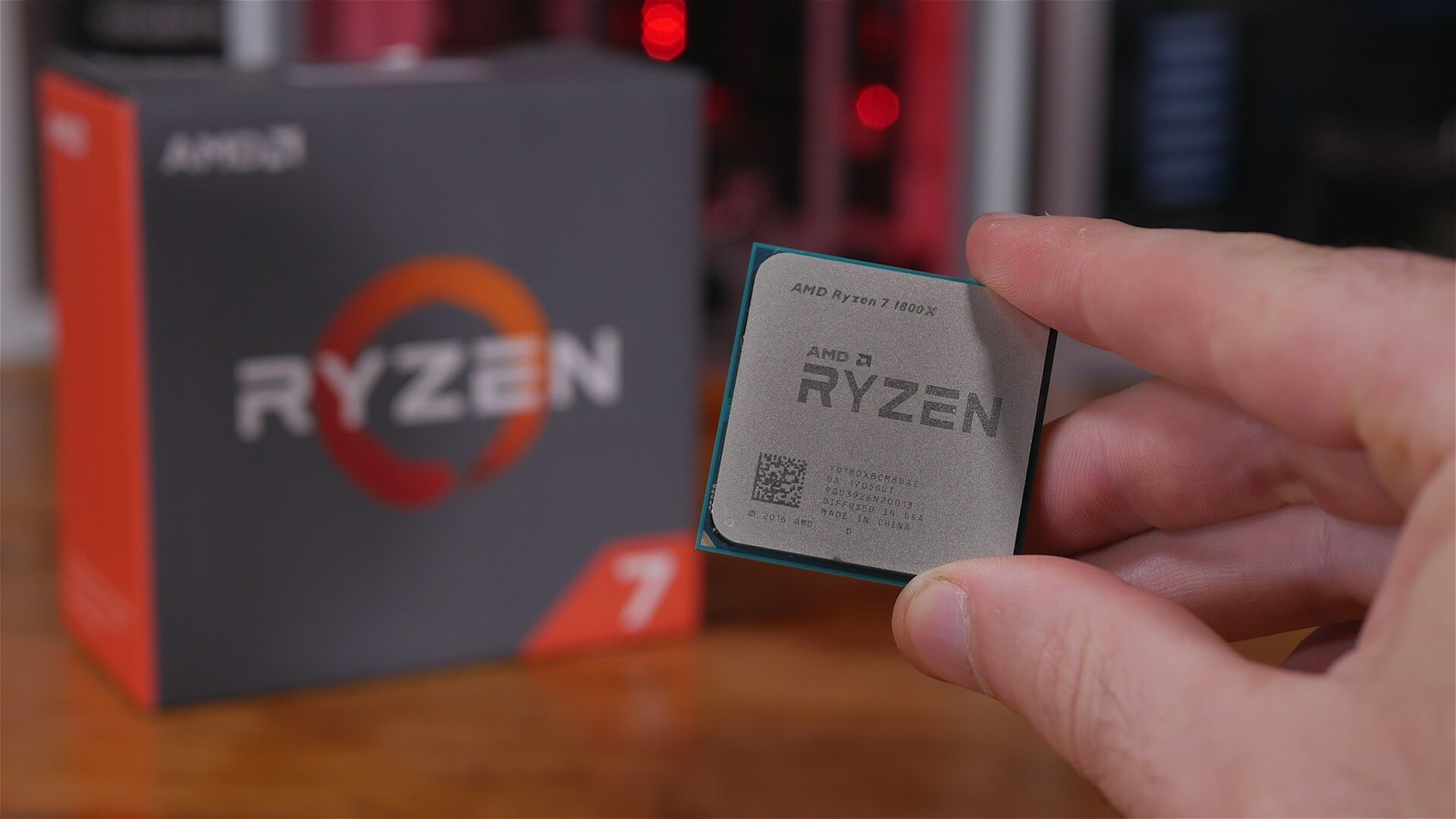With 3rd-gen Ryzen set to hit stores very soon, we're warming up to that launch by revisiting some heated CPU battles from the past couple of years that can bring further context to current owners of these processors.
Today's shoot out is between the Ryzen 7 1800X and Core i7-7700K. But before we get into it, some disclaimers. We're testing the 1800X and not the cheaper 1700 partly because we wanted to make it a one-on-one test and time was of the essence, thus we could only pick one Ryzen 7 processor. The 95 watt TDP 1800X is a better Ryzen 7 representative, if we could only pick one.
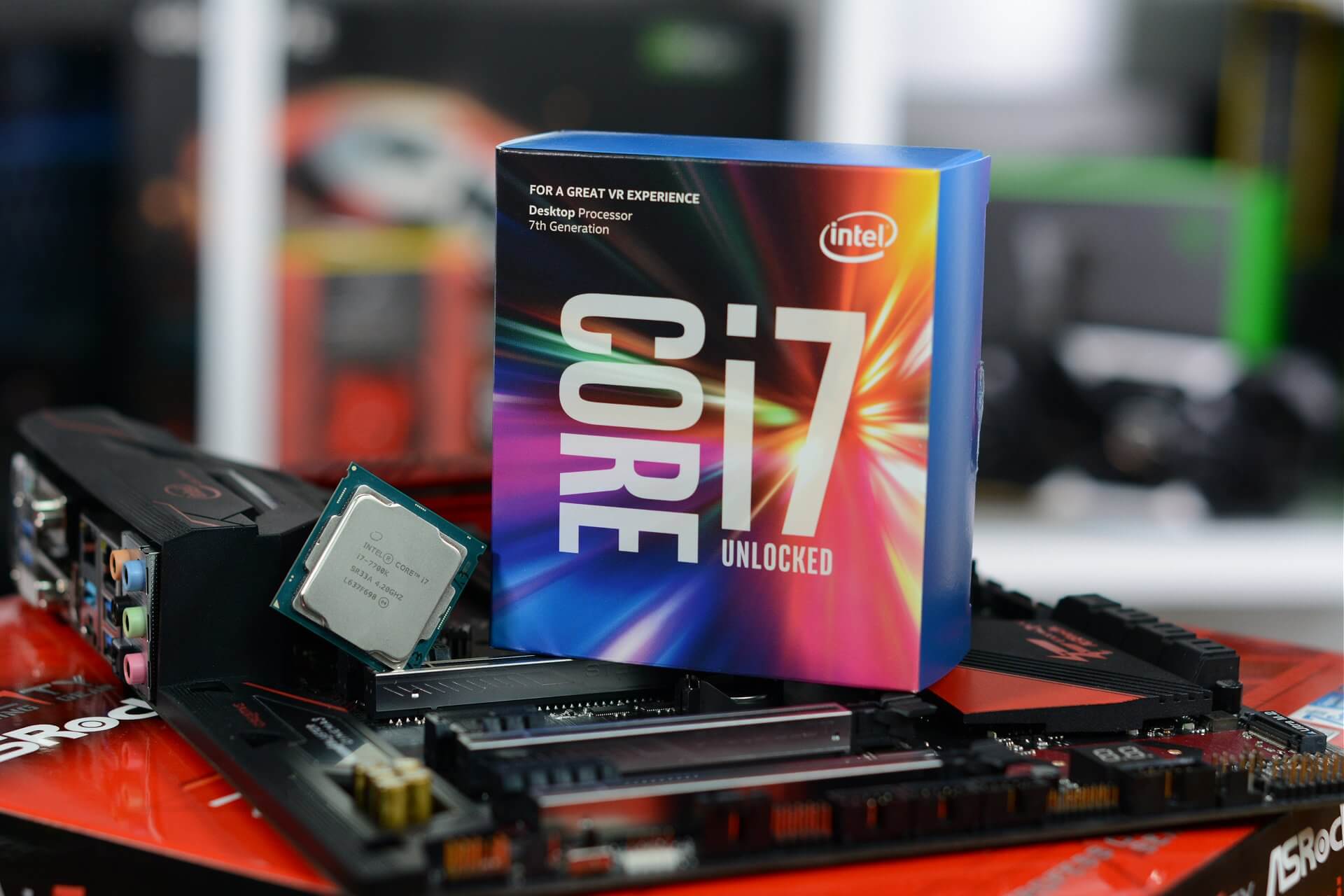
Upon release the 1800X carried an MSRP of $500 making it considerably more expensive than the Core i7-7700K at $340. This made the Ryzen 7 1700 a more direct competitor as it was priced at just $330. However it wasn't long before AMD executed some price cuts and the 1800X dropped down to roughly match the Core i7 processor.
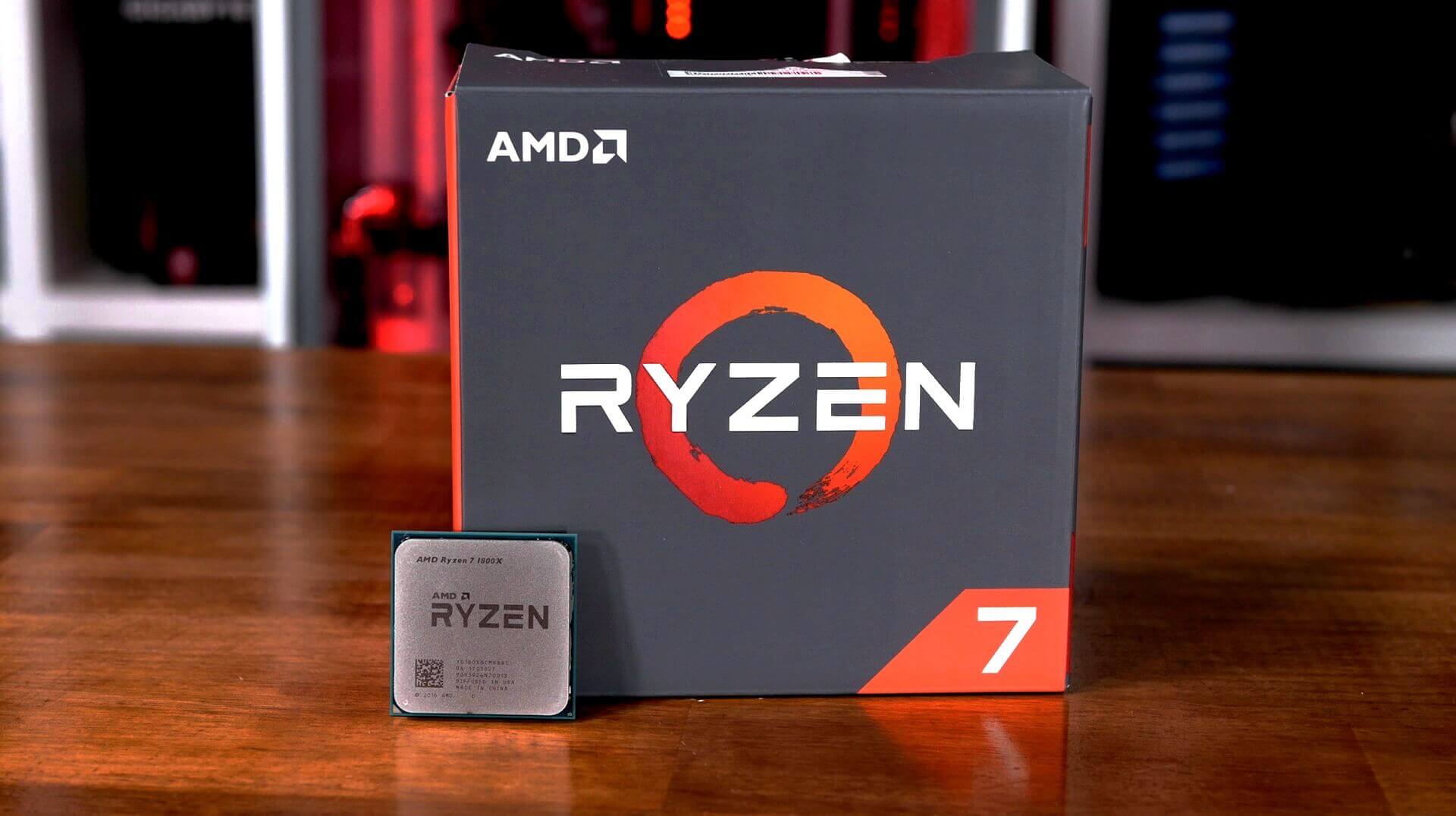
To be precise, the 1800X dropped to just $320 in the same year of its release, and has since dropped as low as $220. As part of our test we're also overclocking both Core i7 and Ryzen 7 processors. The R7 1700 typically hit 4 GHz and thus should deliver the exact same overclocked performance that you'll see today from the 1800X.
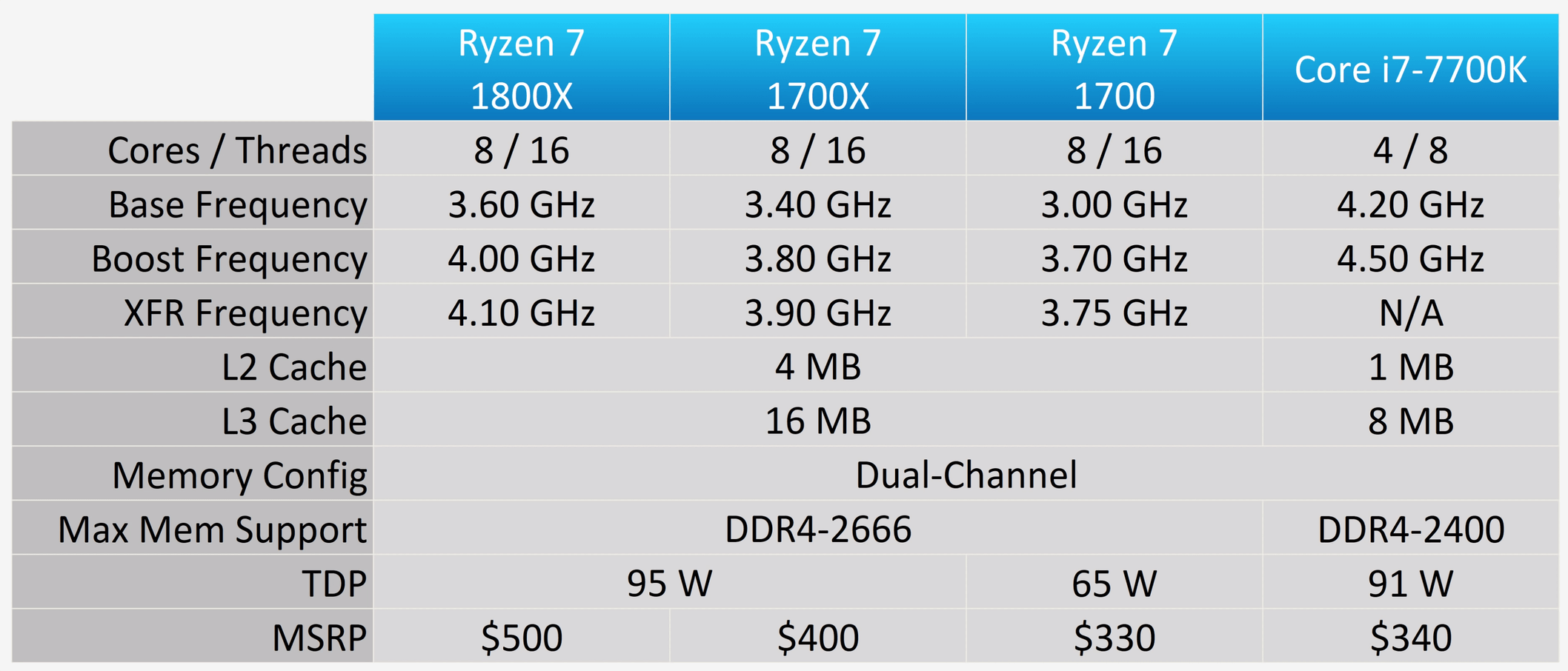
On the memory front we debated internally about using the expensive low-latency Samsung B-Die stuff, and ultimately decided to use G.Skill's FlareX DDR4-3200 CL14 memory for a few reasons: these aren't budget processors, so spending a bit extra on the memory isn't out of the question and second, we're testing CPU gaming performance with an RTX 2080 Ti to remove the CPU bottleneck, so why would we do that and then limit performance by using slower system memory.
That was our reasoning and it shouldn't bother you too much one way or the other as long as both CPUs were tested with the exact same memory. We've tested 9 games at two resolutions, stock and overclocked, along with a few application benchmarks. Let's get into it.
Application Benchmarks
Starting off this session we have Cinebench R20 which has always been good at showing the two tales of Ryzen. Here we have the multithreaded performance and despite a rather large clock speed deficit we see Ryzen has no trouble stepping all over the Core i7 processor. Out of the box the 8-core processor is an impressive 55% faster, though it has the advantage of doubling up on core count, of course. Still when fully utilized it's clear the 7700K is no match for the 1800X.
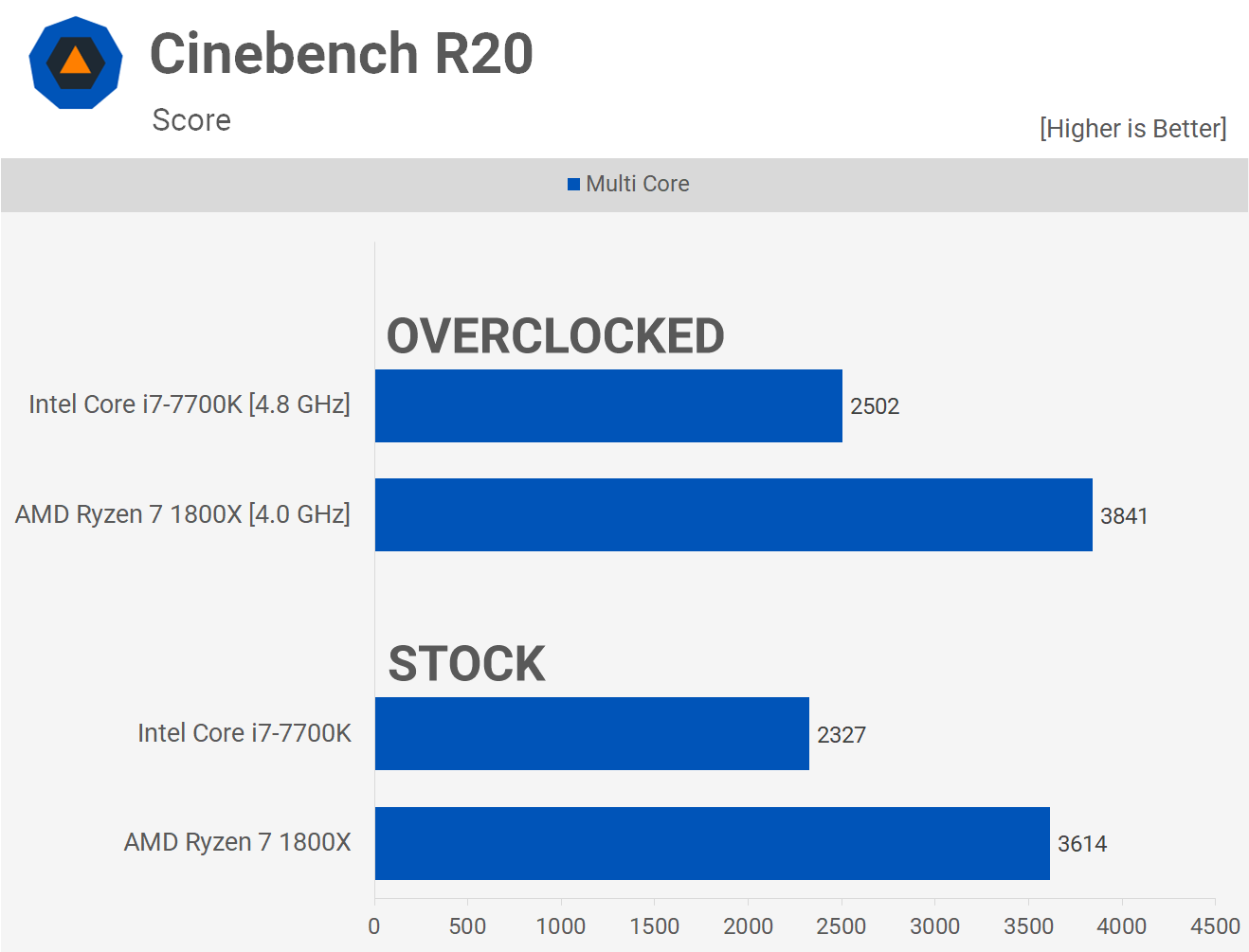
Here's the other side of the story: single core performance. The Core i7-7700K is 22% faster out of the box and when overclocked. This gives the Intel CPU a significant advantage in lightly threaded workloads.
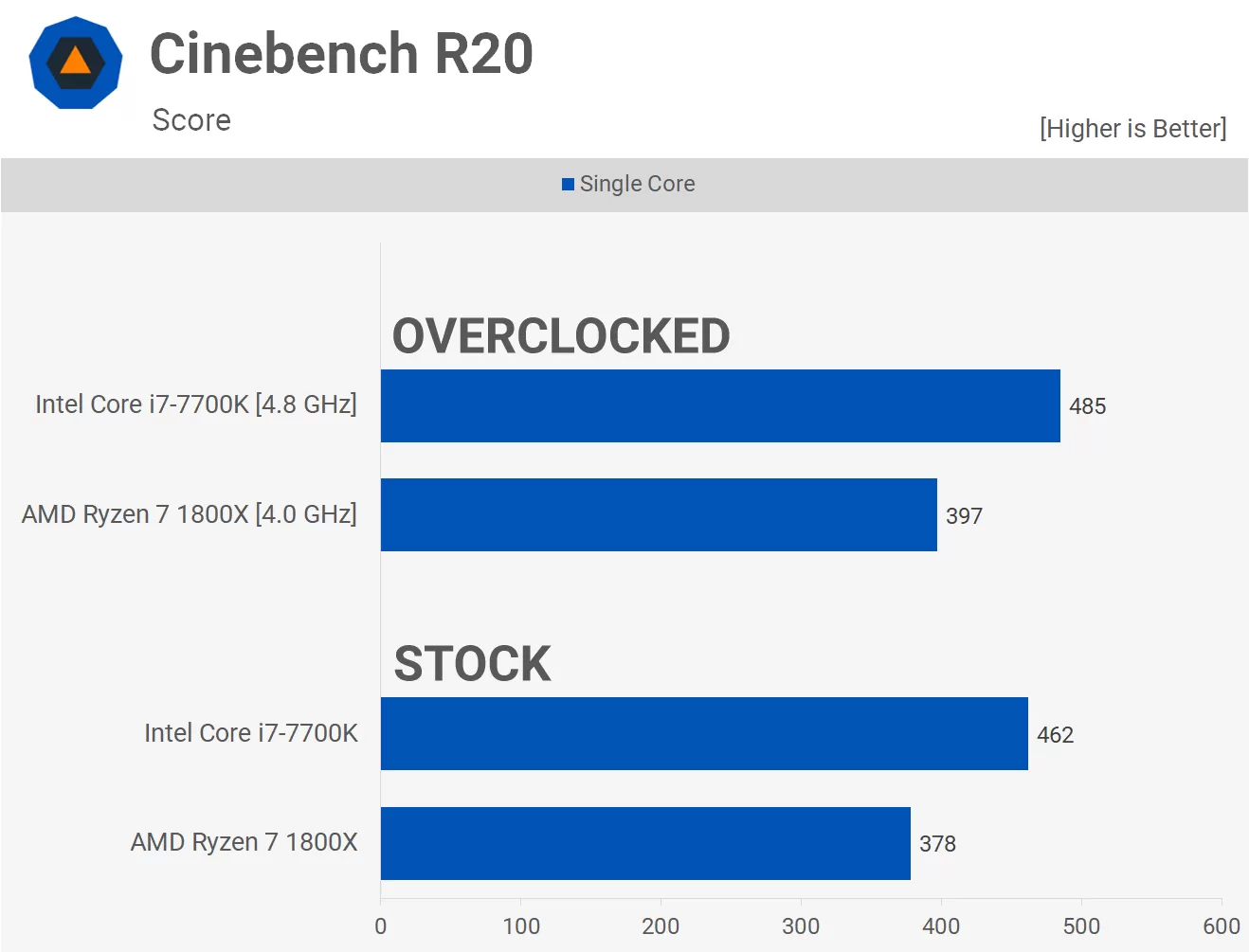
WinRAR is more about memory bandwidth and latency than it is cores and as a result the 7700K is ~8% faster in this particular workload. Not a massive difference but after seeing the Cinebench R20 multicore test, this isn't the result you might have expected.
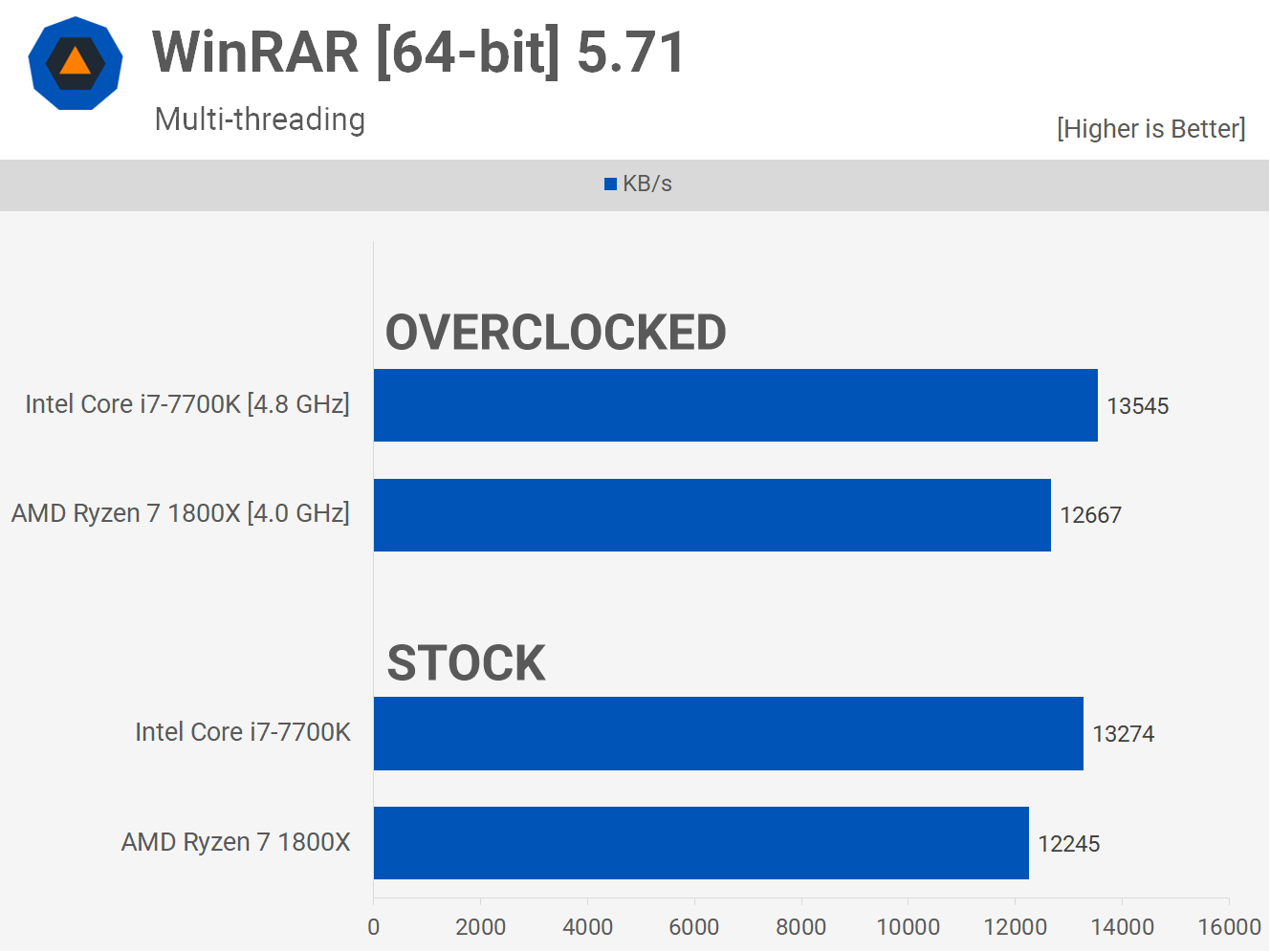
Moving on we have a benchmark that's of particular importance to creators and video editors. I use Premiere Pro almost on a daily basis so I directly relate. Note that lower is better here as we're looking at the time it takes to encode one Hardware Unboxed video into the 4K H.264 format. The R7 1800X is 43% faster in this test, taking 508 seconds out of the box. So for content creators the 8-core CPU is the obvious choice.
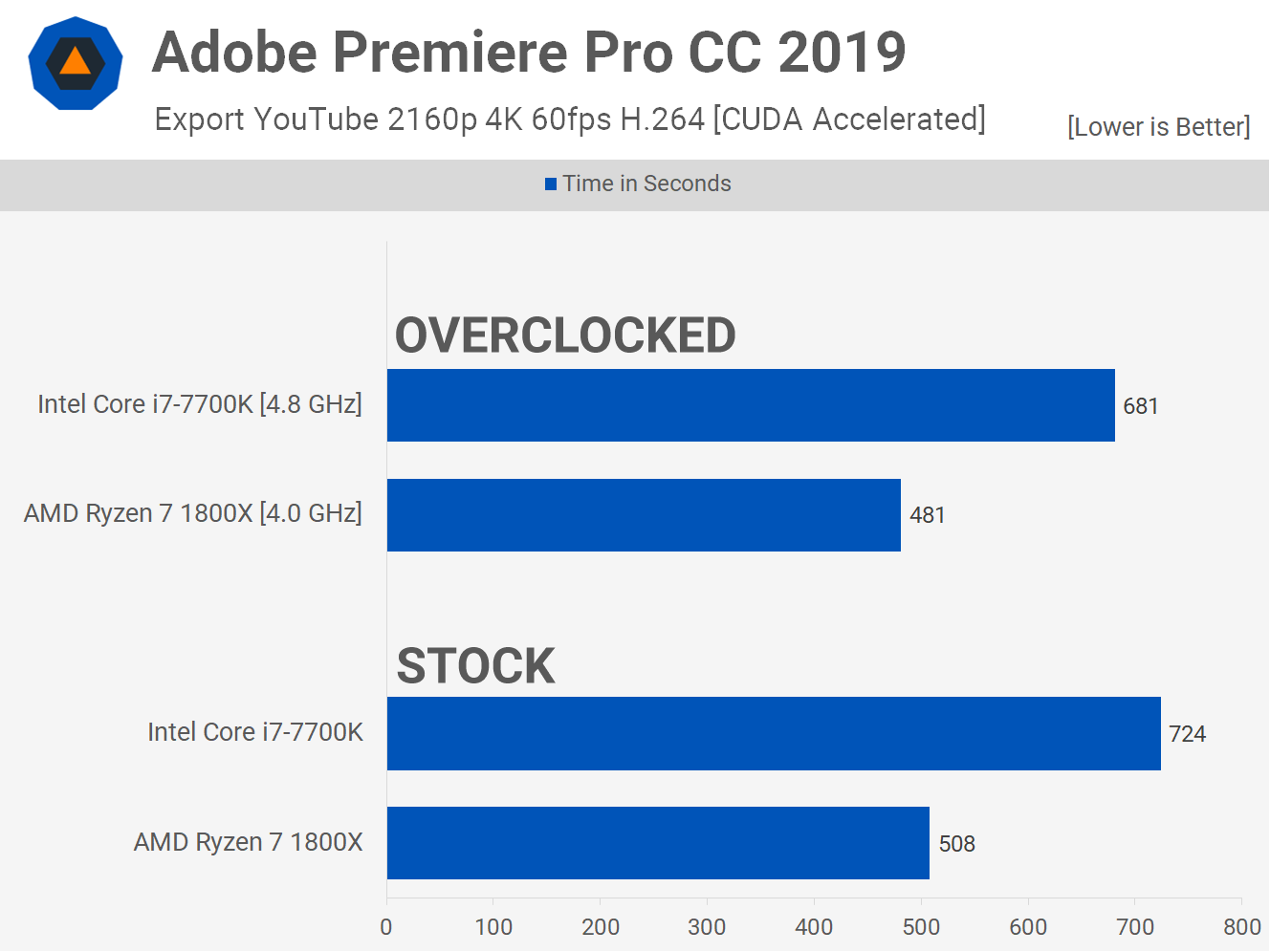
Likewise the 1800X was welcomed with open arms by 3D modeling professionals. Here we see when using the latest version of V-Ray, the 1800X is 57% faster than the 7700K out of the box and 50% once both CPUs are overclocked.
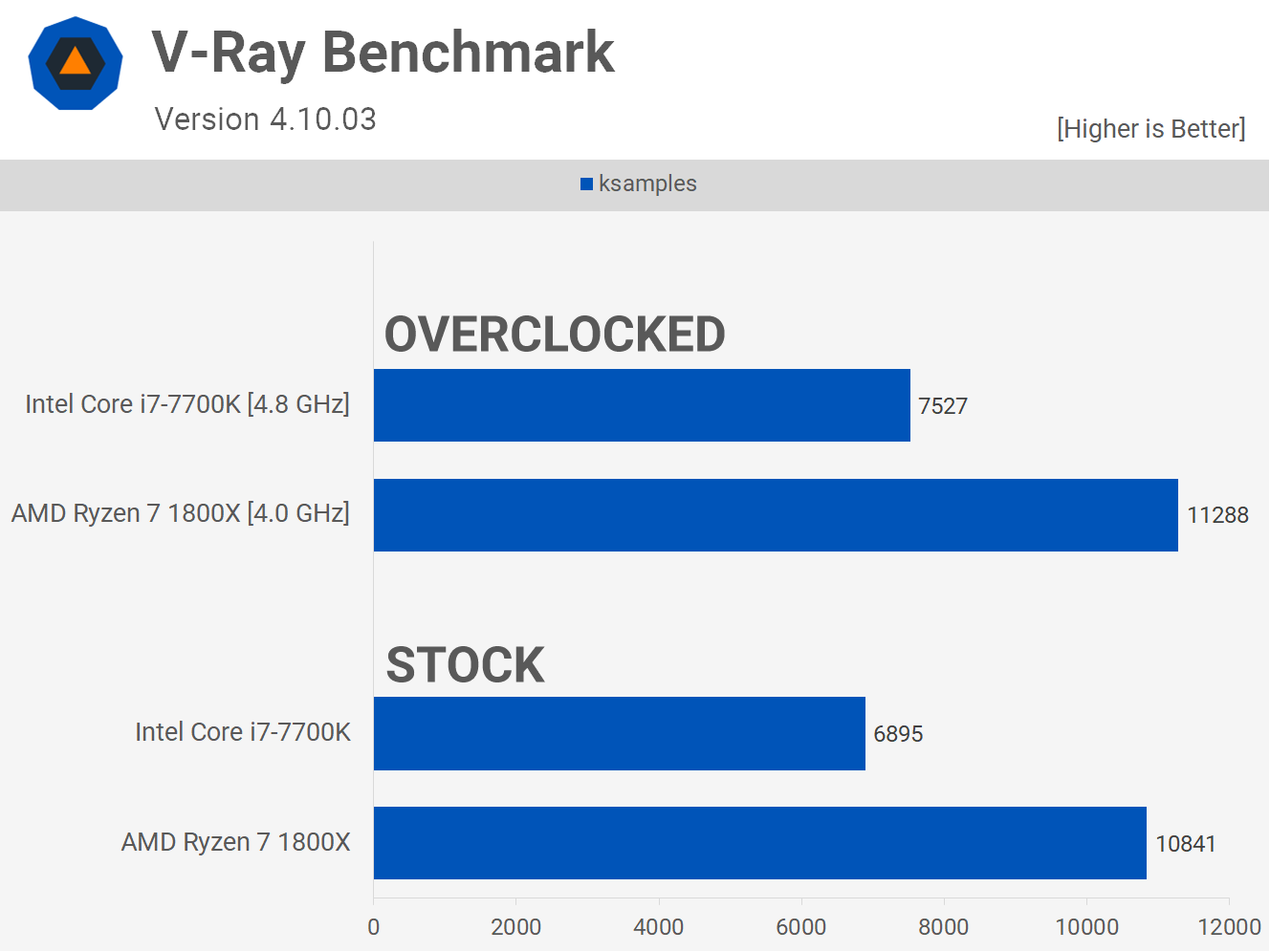
We see a similar story with Corona: the 1800X was 57% faster out of the box, completing the task in just 131 seconds.

The last application benchmark we're looking at is Blender and here the 1800X was 62% faster stock and 60% faster when overclocked, a massive advantage here for Ryzen.
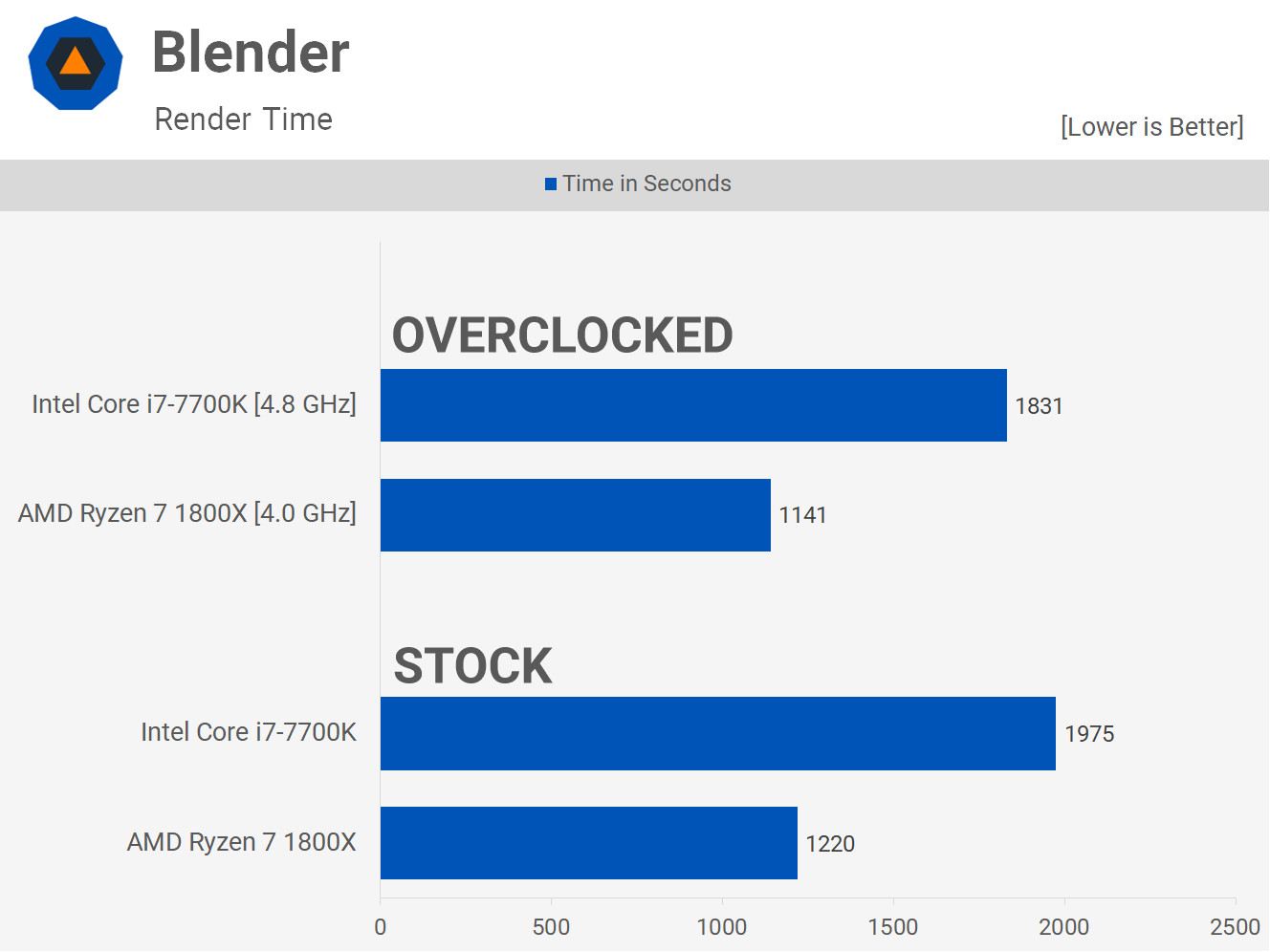
When running our Blender workload we also measured total system consumption and here the Ryzen 7 1800X pushed power draw 26% higher, which is a positive result for around a 60% increase in performance. Overclocking does blow Ryzen's efficiency out the window though and frankly the 32% increase in system power draw isn't worth the minor increase in performance.

Gaming Benchmarks
Time for some games. First up we have Assassin's Creed: Odyssey where the 7700K was 5% faster on average and 8% faster for the 1% low result. These margins remained fairly the same once overclocked.As you'd expect moving to 1440p reduces the margin as we become slightly more GPU limited and once overclocked both CPUs were able to max out the RTX 2080 Ti. It's worth noting that we're not using the highest quality settings in Assassin's Creed: Odyssey either, so it's possible to make the game much more GPU bound without a resolution increase.
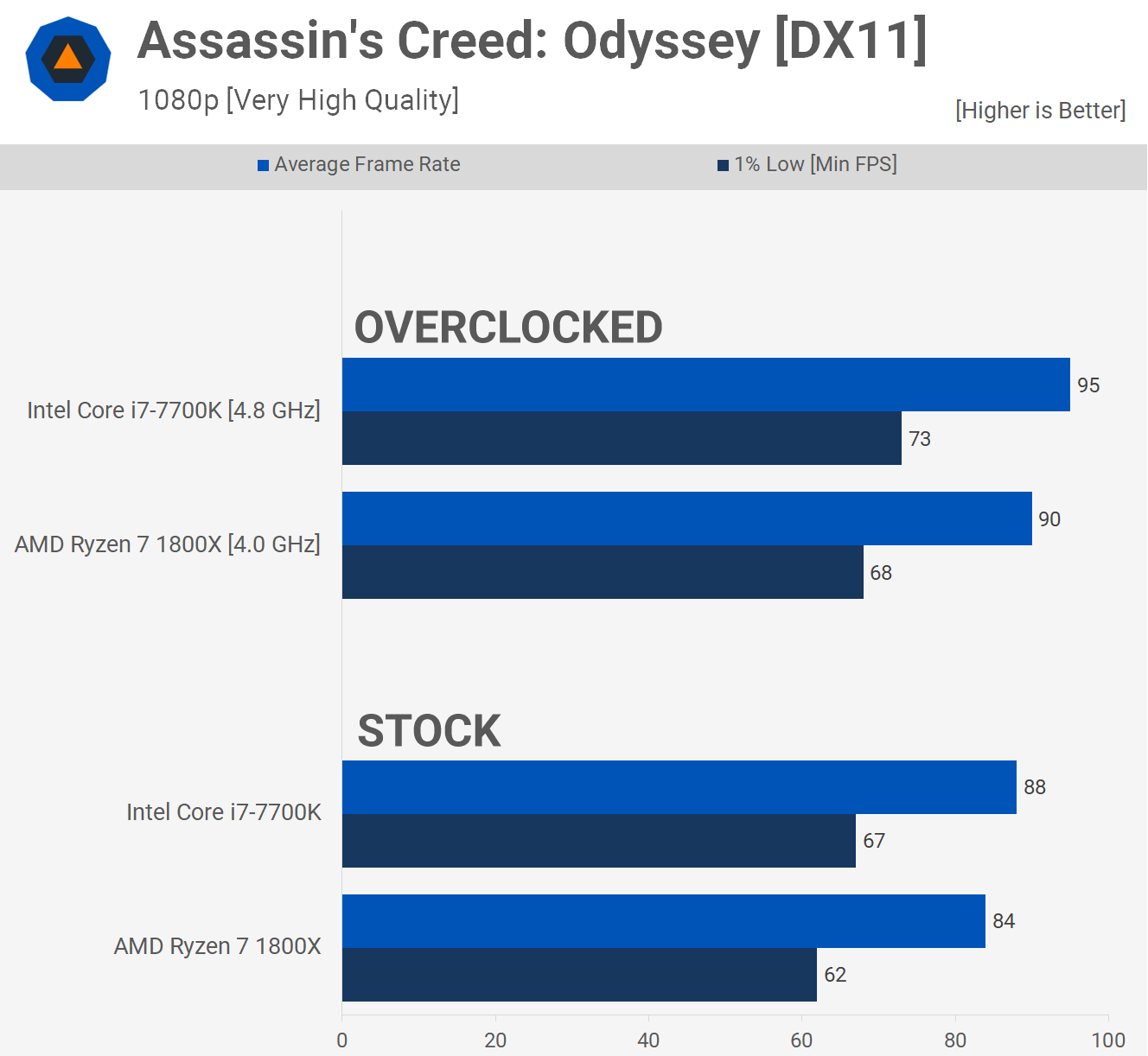
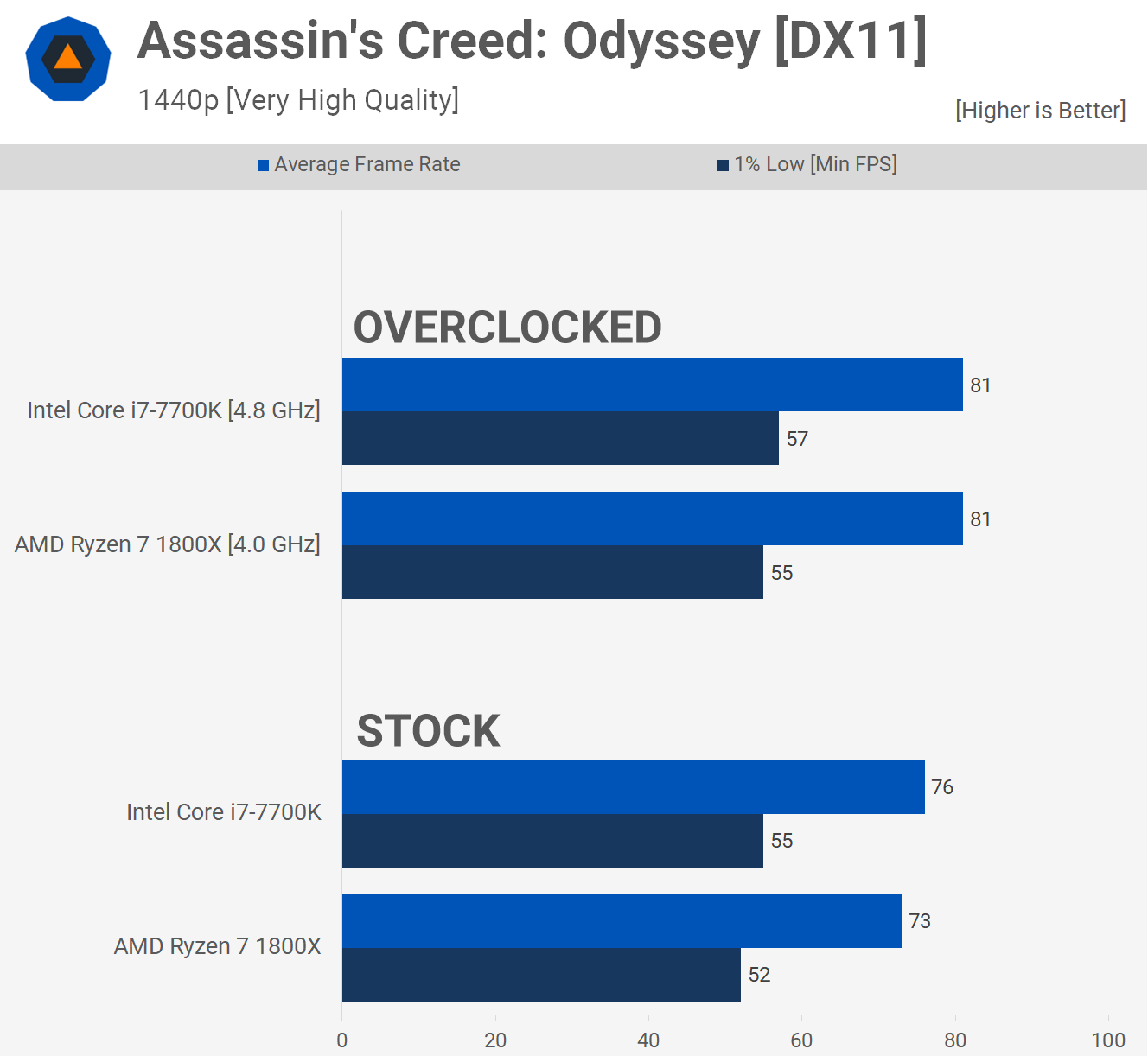
The Battlefield V results are interesting, here the 7700K is maxed out and while it does much better than the 7600K, we can see that the 1% low performance is down on the 1800X which enjoys considerably more breathing room. So in this instance the average frame rate can be misleading as the 1800X provides the smoother experience.
Even at 1440p the 7700K is still getting maxed out and as such provides a notably worse experience when compared to the 1800X. The game is still very playable on the 7700K, but given the choice of these two processors for BFV, we're confident most gamers would choose the 1800X.
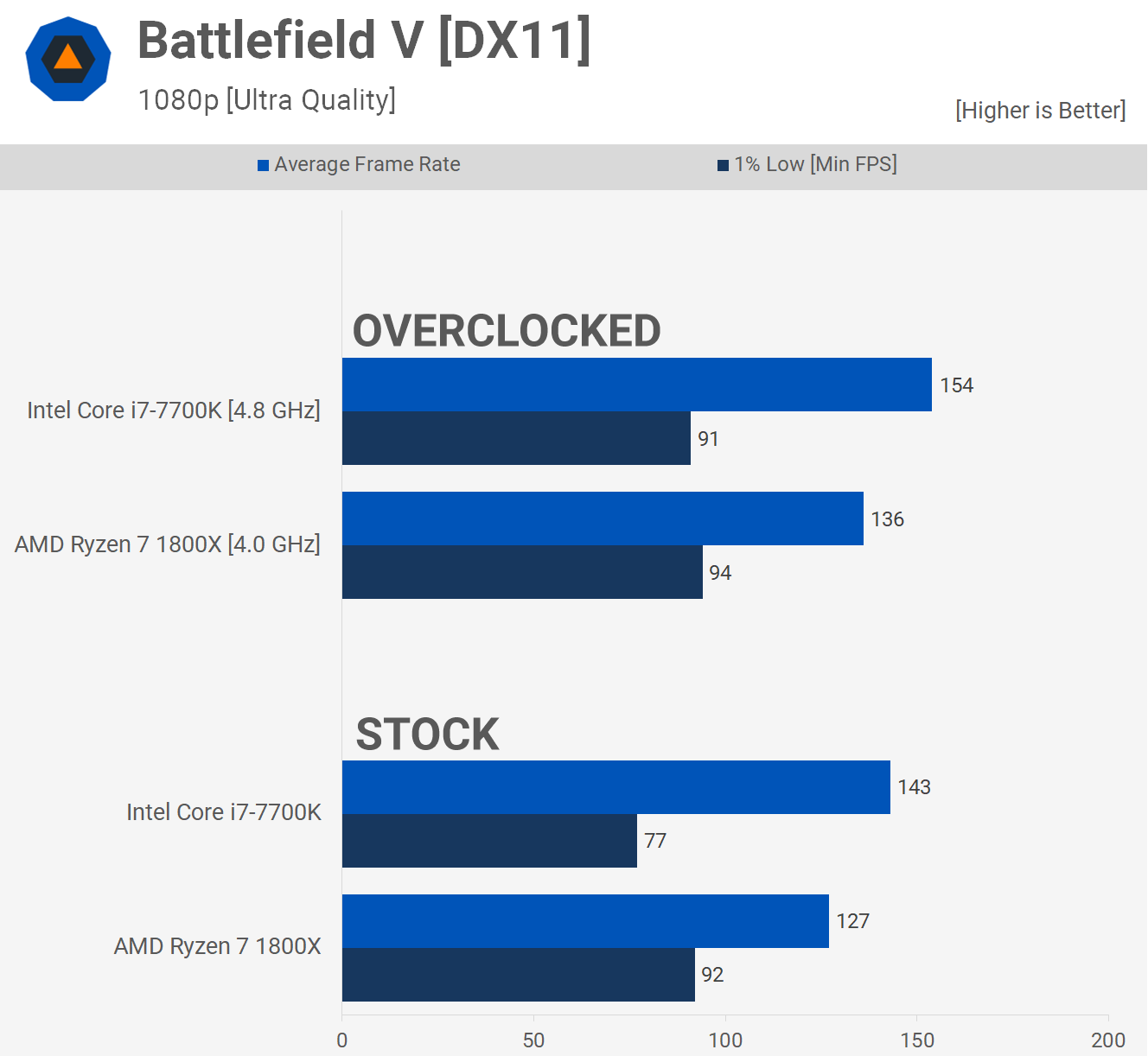
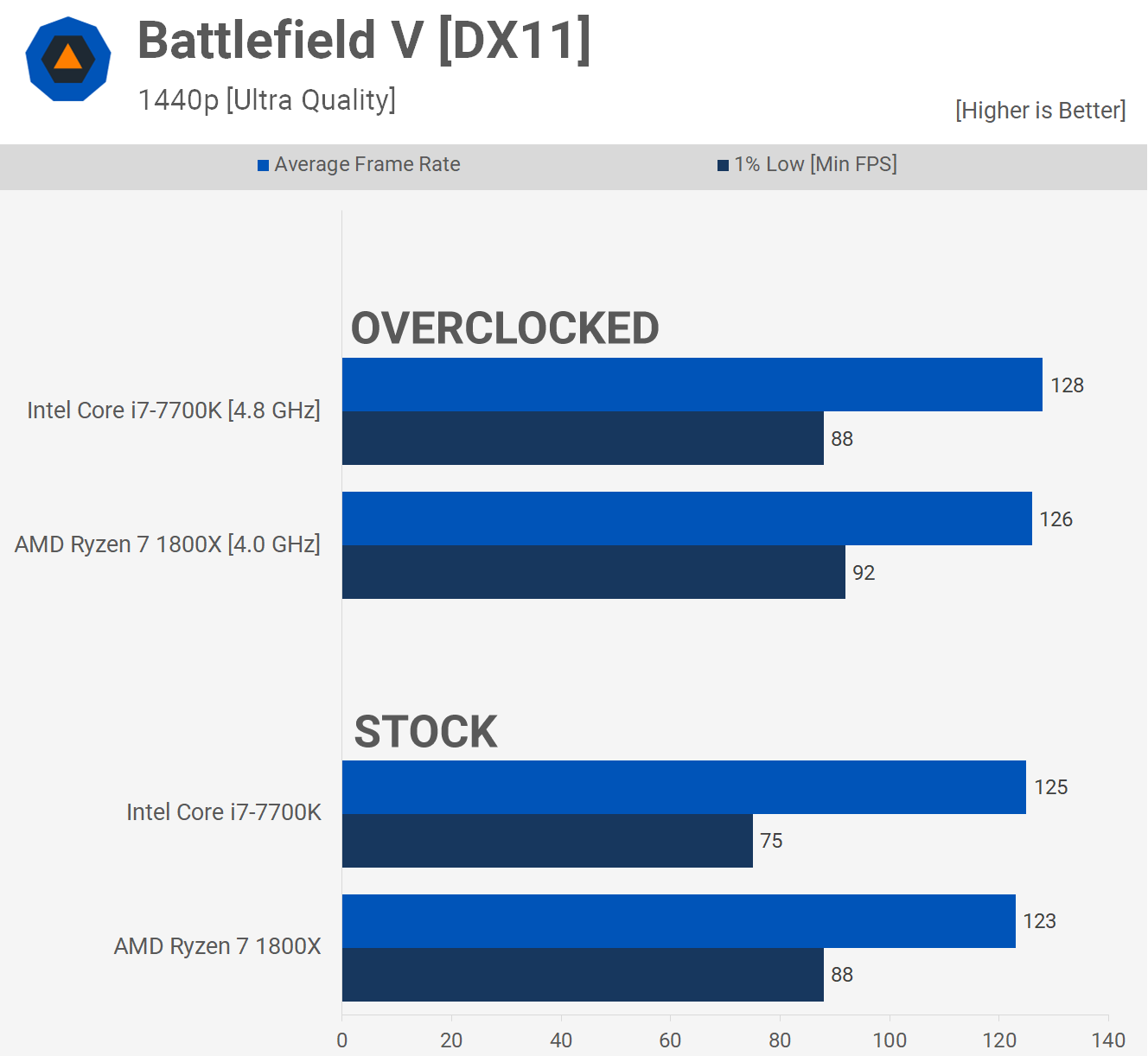
Here we see that the 7700K makes out well in Shadow of the Tomb Raider and this is entirely down to Hyper-Threading support. Previously when testing the 7600K it really struggled in this title and was noticeably slower than the R5 1600. In this instance both the 7700K and 1800X delivered smooth playable performance, but overall the Core i7 processor was faster and by a reasonable 11% margin.
Jumping to 1440p cuts that margin down, but the 7700K was still faster by a 6% margin when comparing the average frame rate.
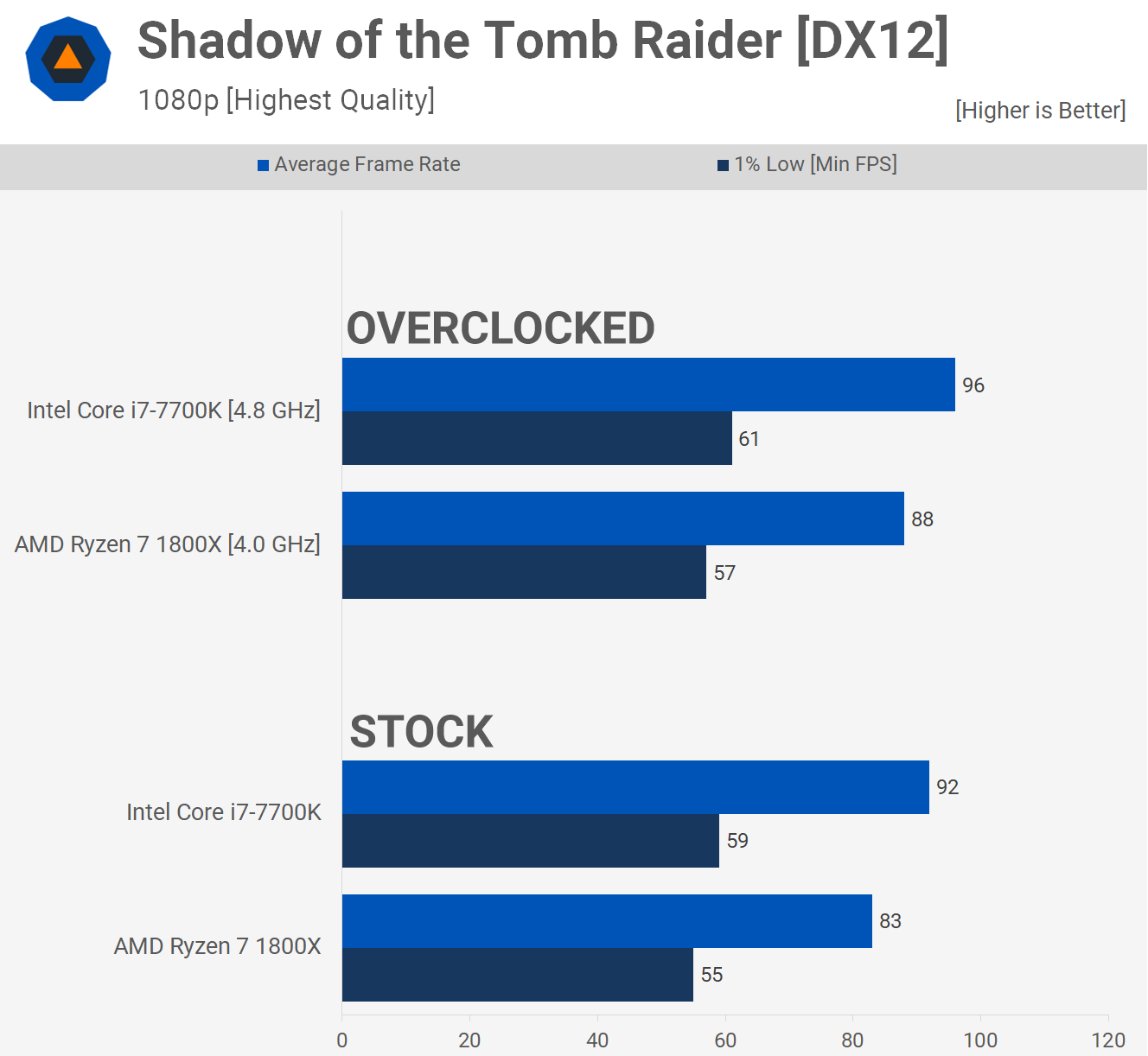
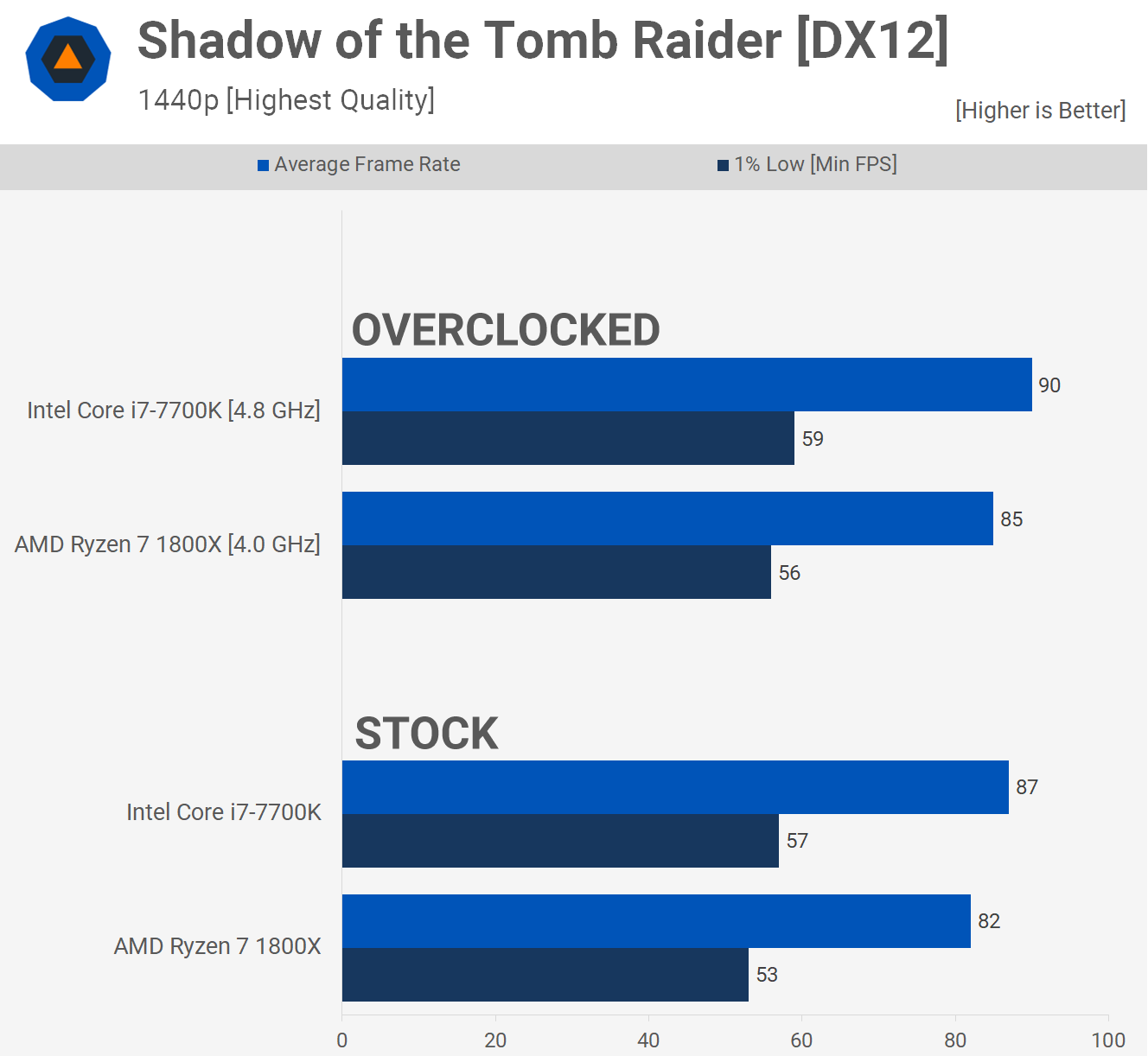
The Division 2 is another title where the 7600K struggled, but with the aid of Hyper-Threading the 7700K makes out just fine and is quite a bit faster than the 1800X when comparing 1% low performance.
The 1800X makes a comeback at the more GPU limited 1440p resolution, and yet the 7700K managed a comfortable 11% lead when comparing the 1% low results.
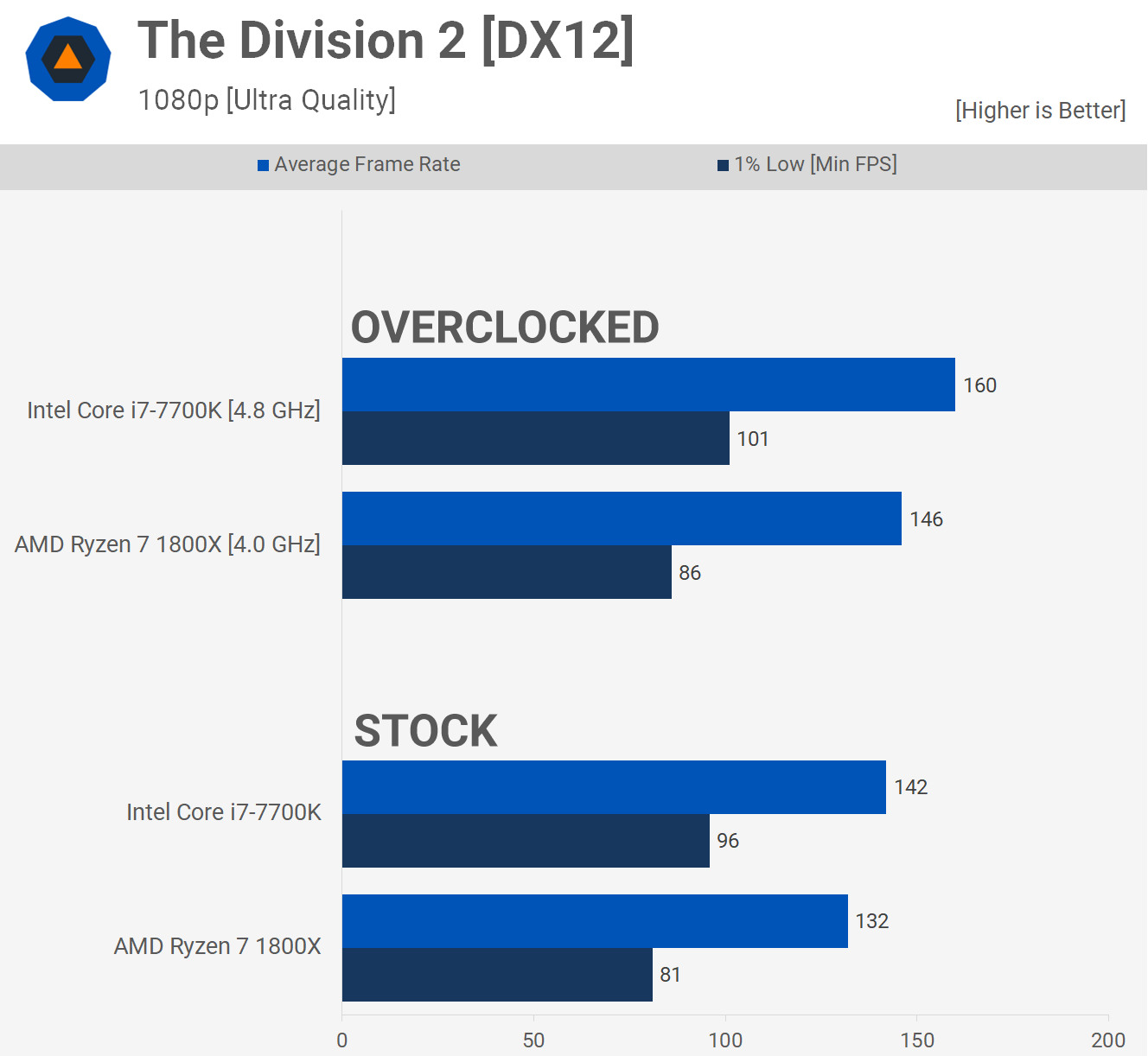
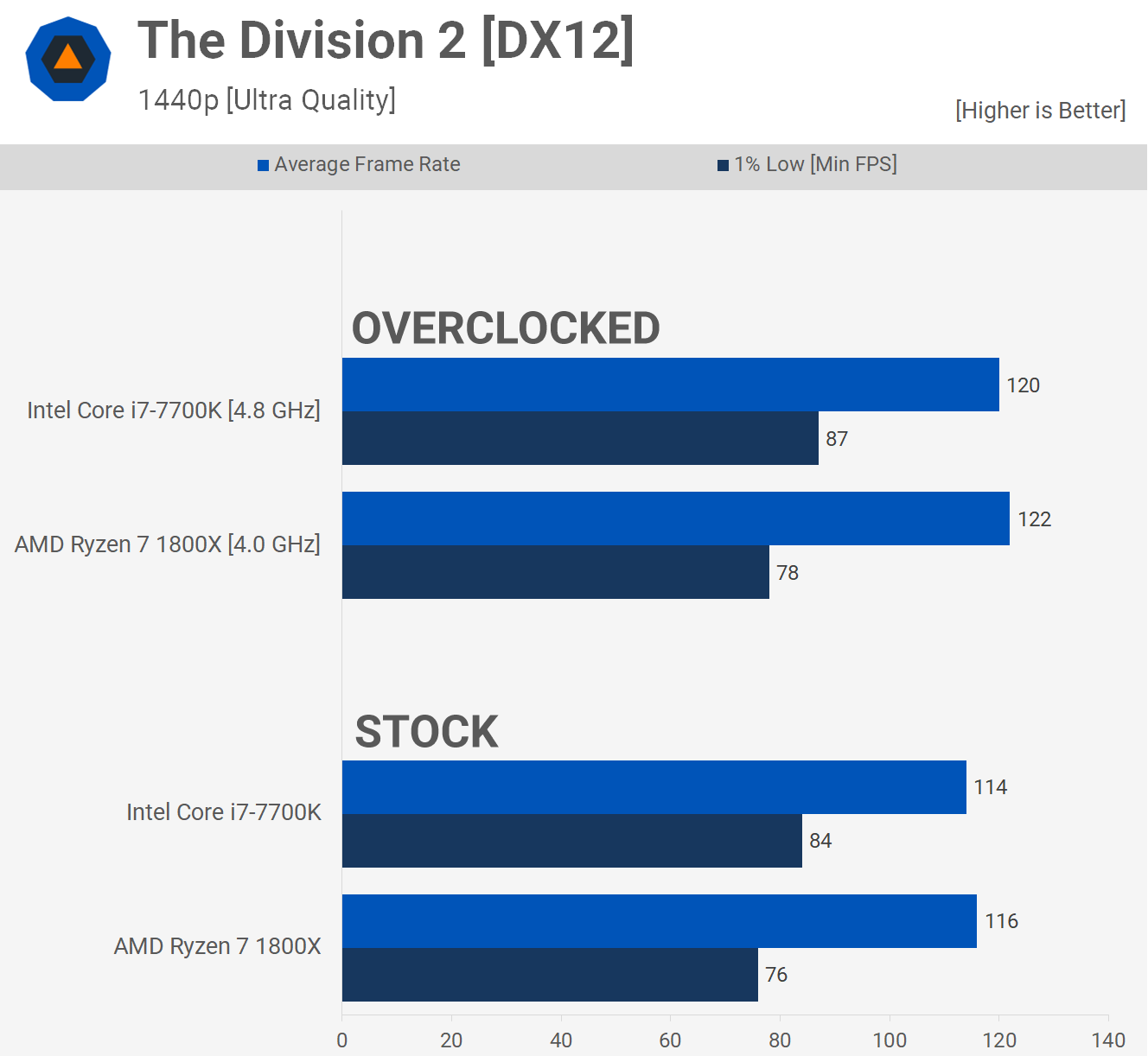
Once again we see that Far Cry is a title where Ryzen CPUs tend to struggle. Here the 7700K was a whopping 24% faster out of the box and 31% faster once overclocked. Ryzen 7 was able to keep frame rates above 60 fps, but the 7700K was just a lot better overall.
Even at 1440p we see that for high-refresh rate gaming in Far Cry New Dawn the 7700K is just a much better processor for the job. This time overclocked it was 35% faster and that's a massive difference for the CPU to make at 1440p, even with an RTX 2080 Ti.
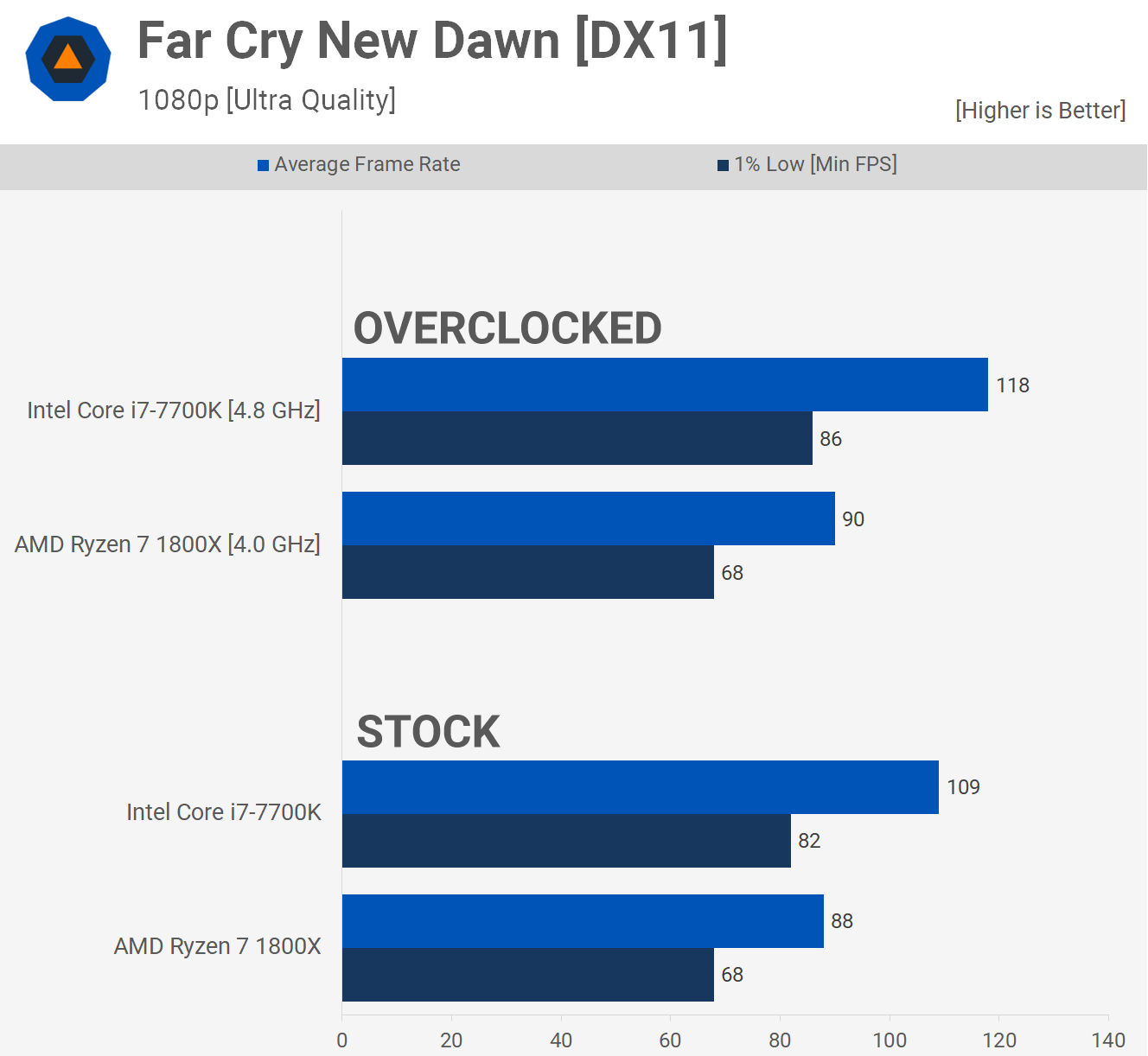
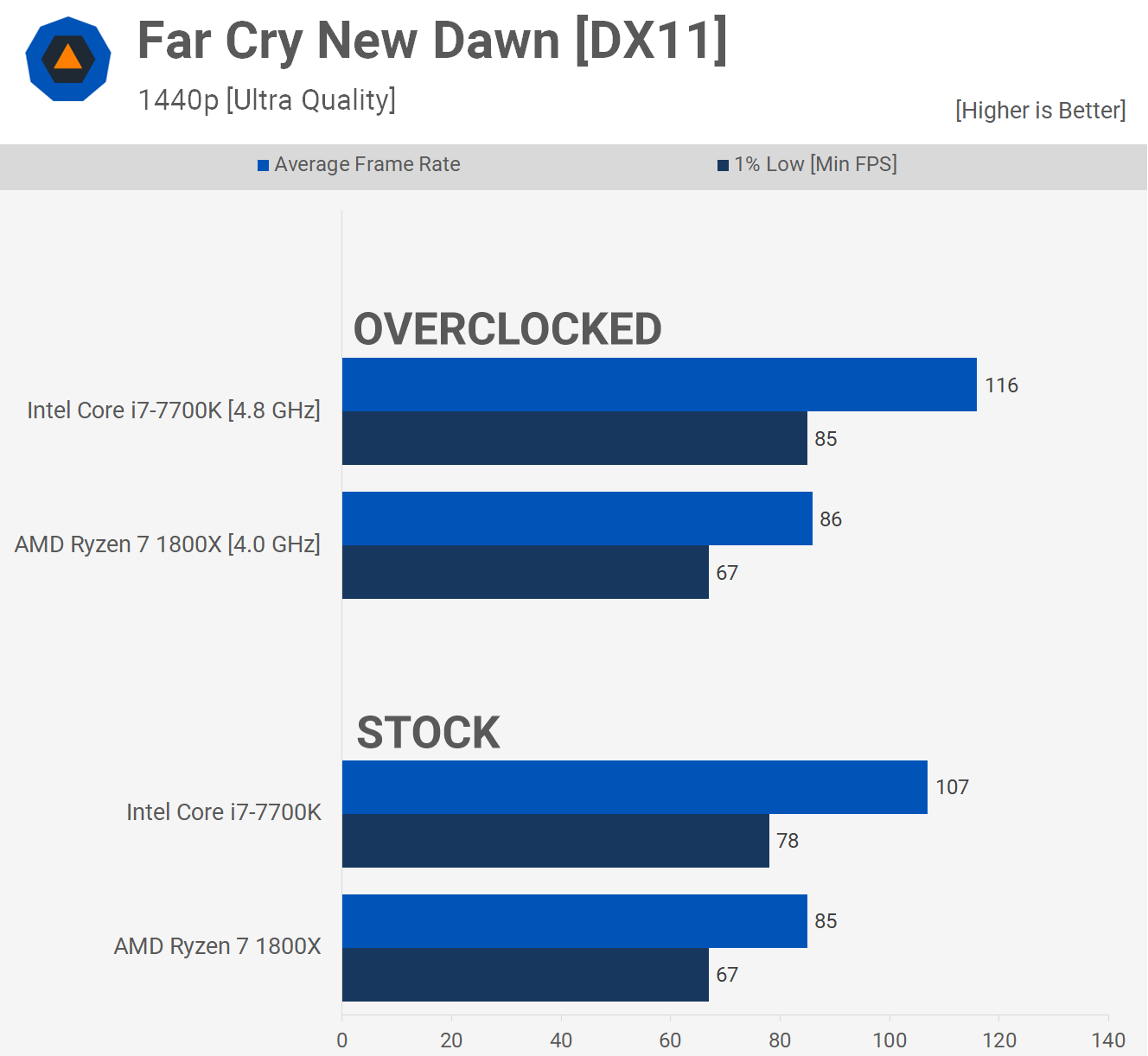
The Ryzen 7 processor also loses out in World War Z but this time the loss is less significant as both CPUs allowed the RTX 2080 Ti to render over 130 fps at all times.
Naturally the margins are reduced at 1440p and here the 7700K was up to 8% faster. Needless to say both CPUs enabled an excellent gaming experience.
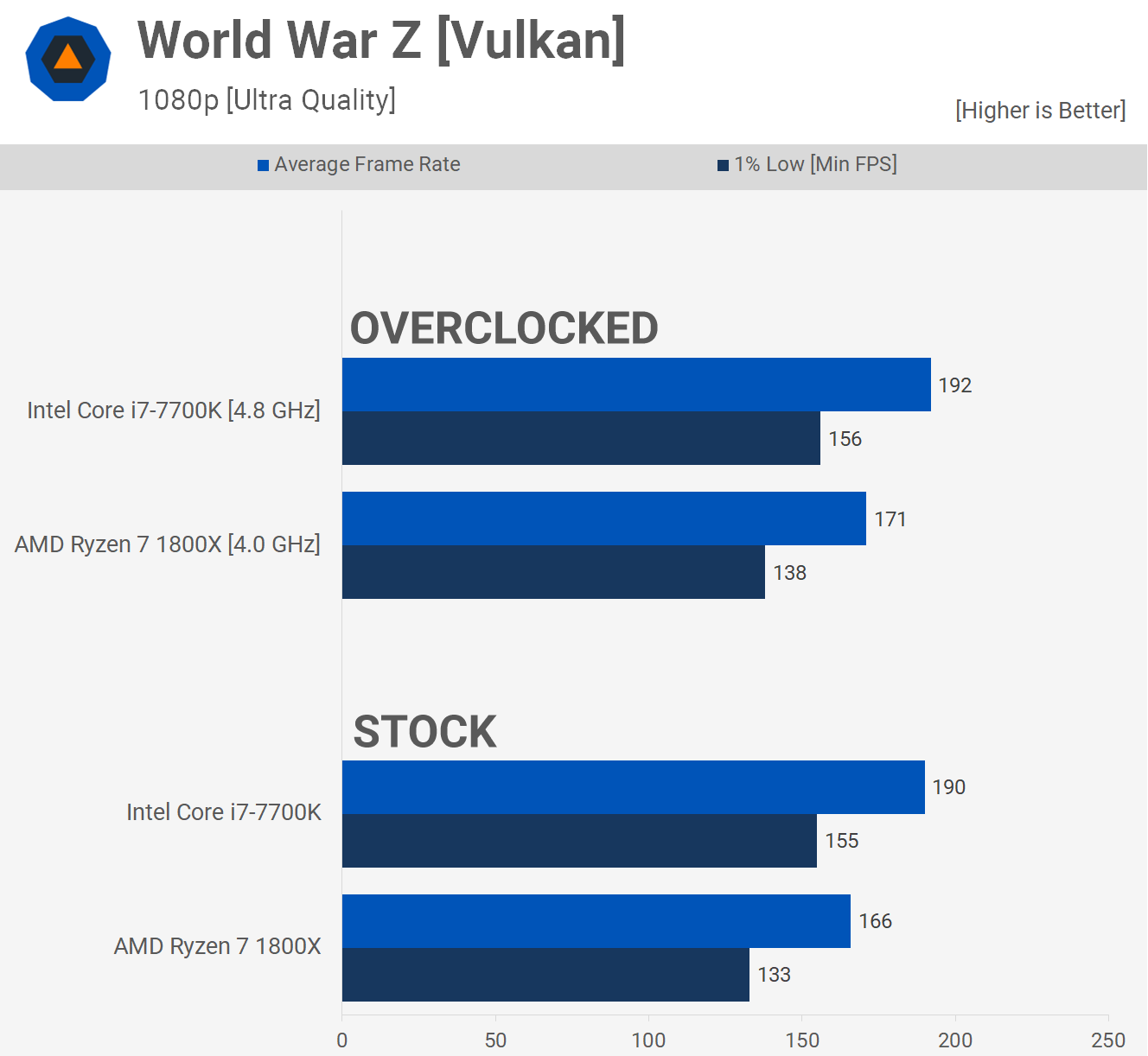
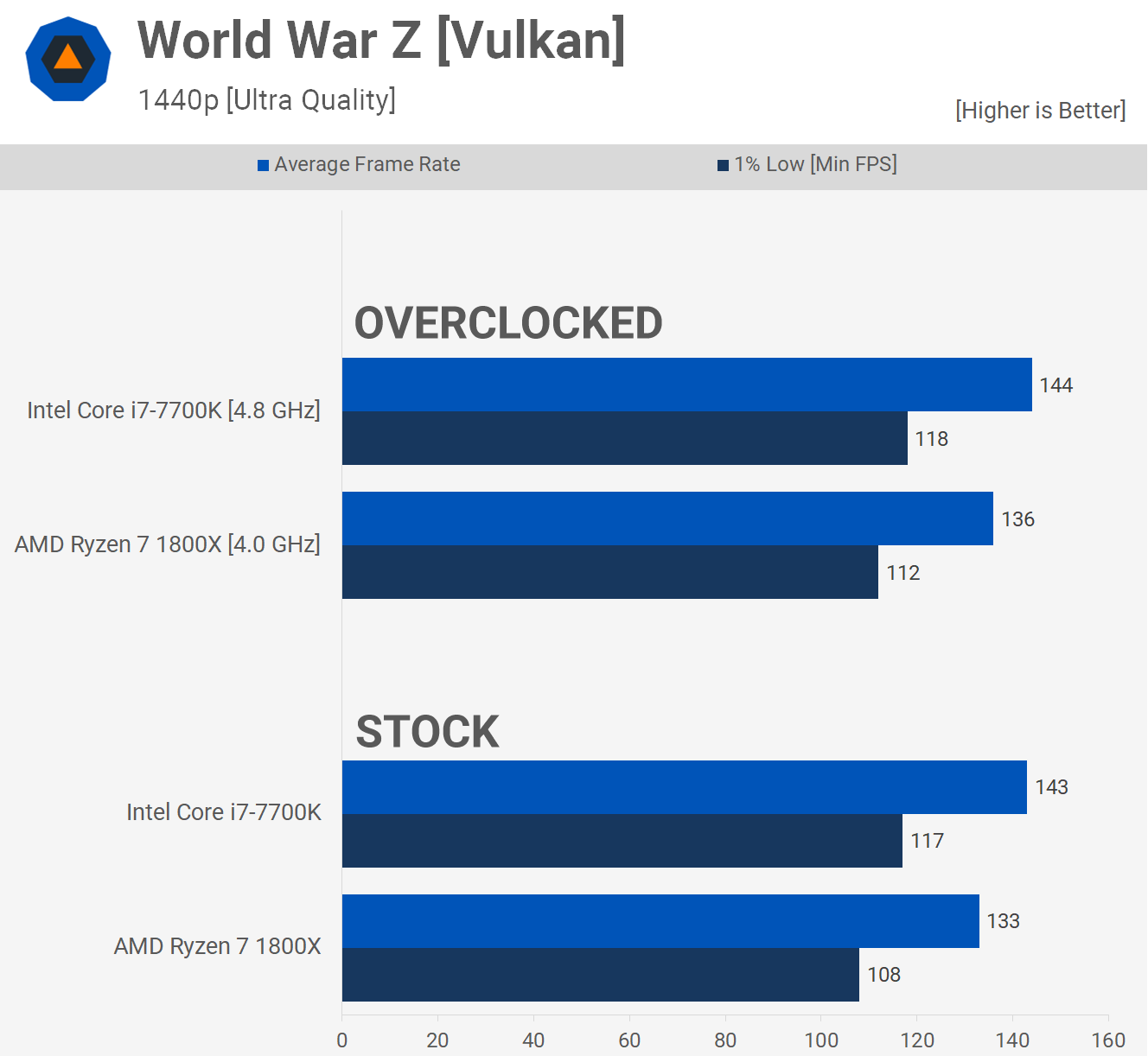
Rage 2 isn't a CPU demanding title and in this title both CPUs provided the same average frame rate. The higher clocked 7700K did sustain a higher 1% low result, offering around 12% more performance.
That margin is reduced to a minimum at 1440p and it's fair to say both CPUs provided the same gaming experience.
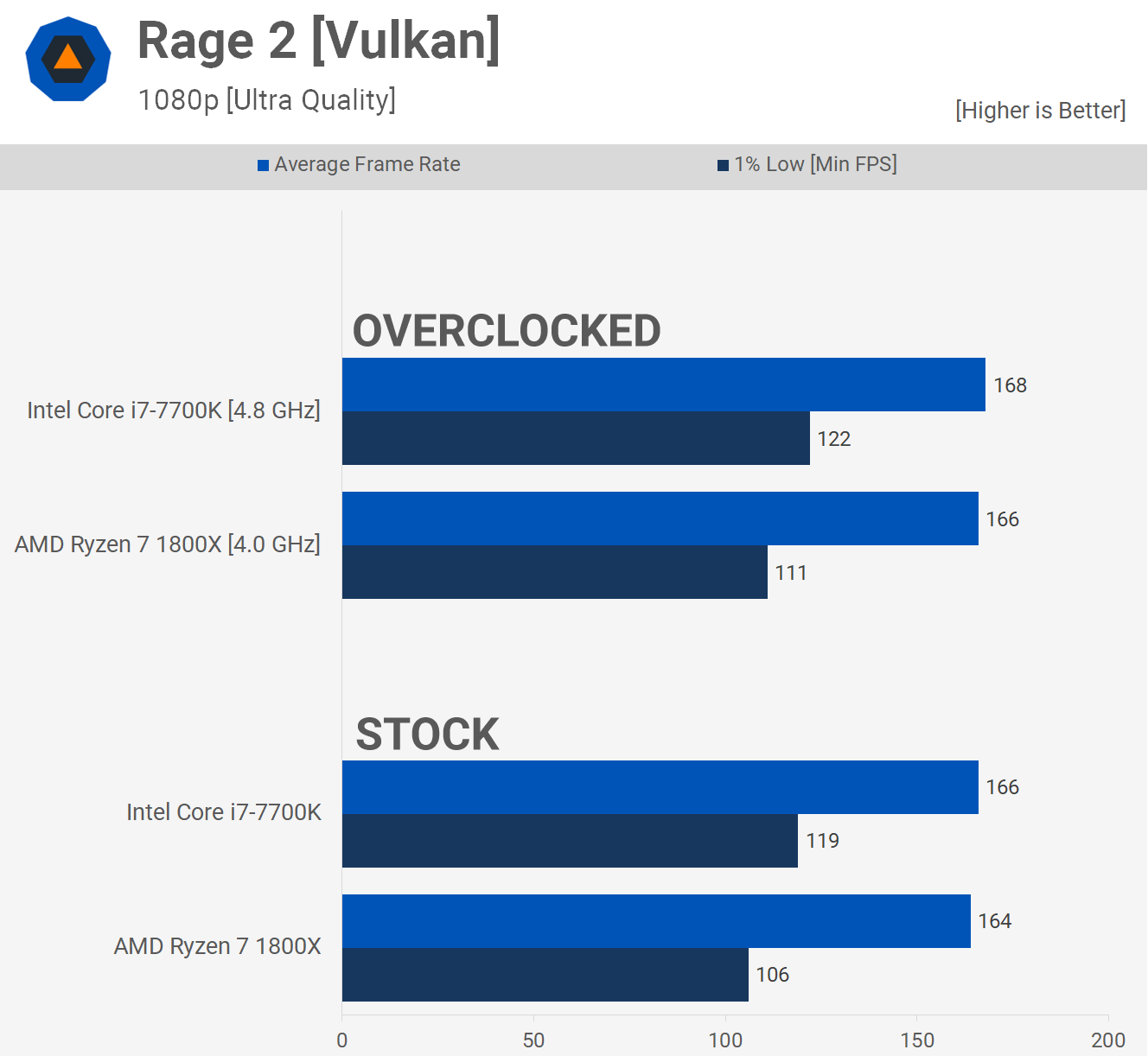
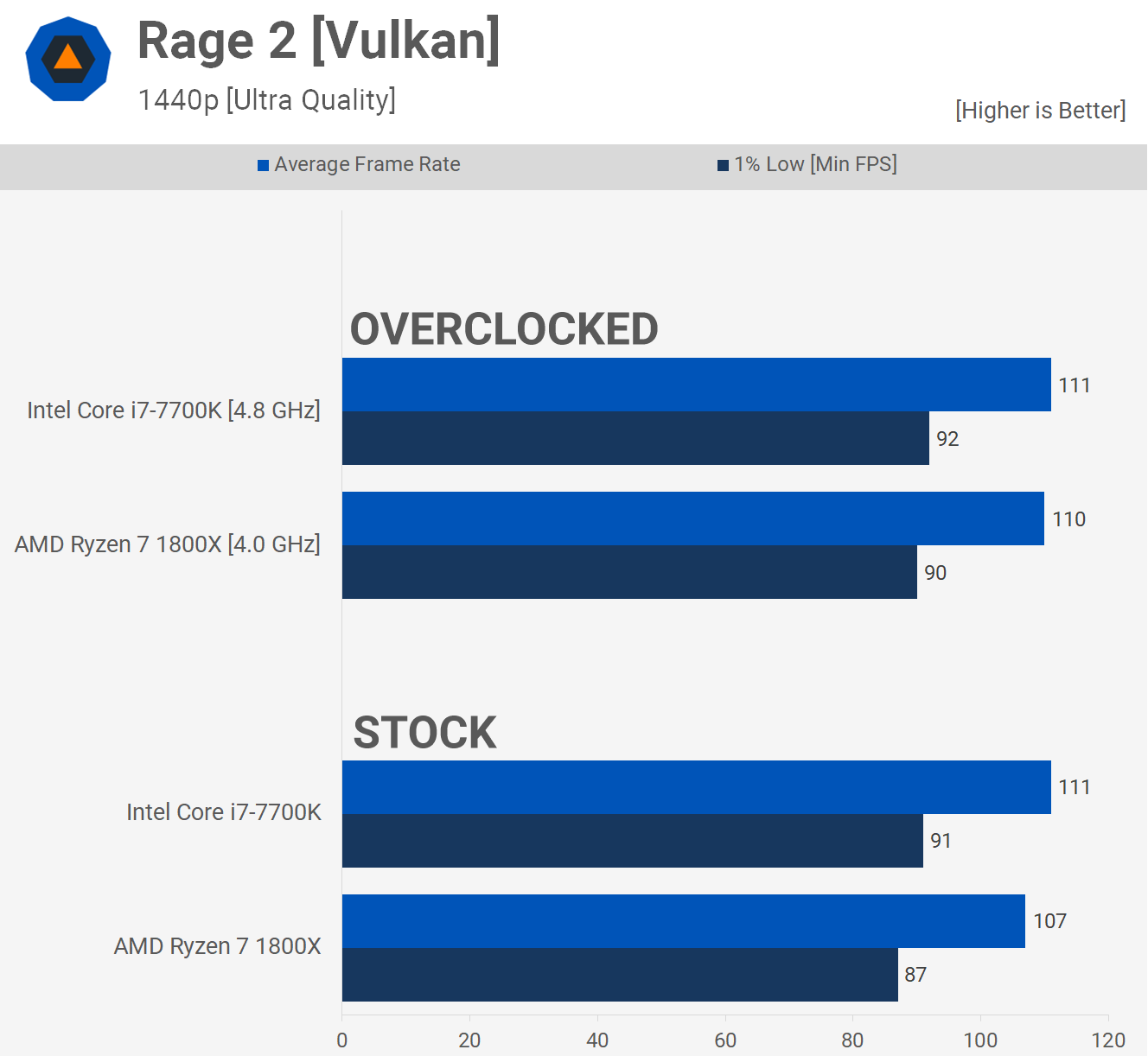
First-gen Ryzen doesn't do that well in Hitman 2 and you will see a significant improvement in performance, especially for 1% lows, when moving to a 2nd-gen Ryzen part such as the 2700X. The 1800X does enable playable smooth performance, but the 7700K manages the same with around 18 to 20% more frames.
Even at 1440p we still appear to be CPU bound and as a result the 7700K provides a slightly better gaming experience.
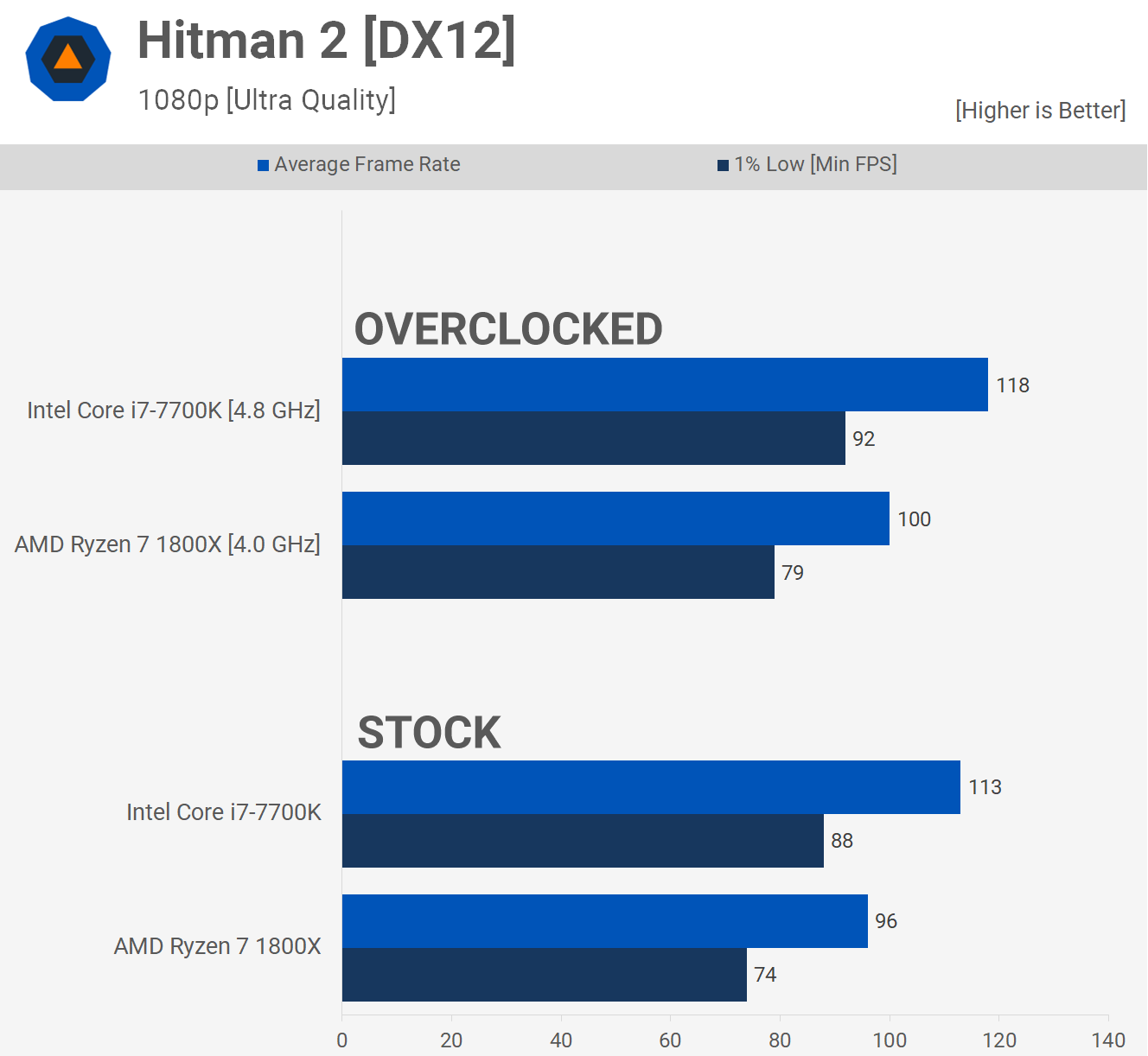
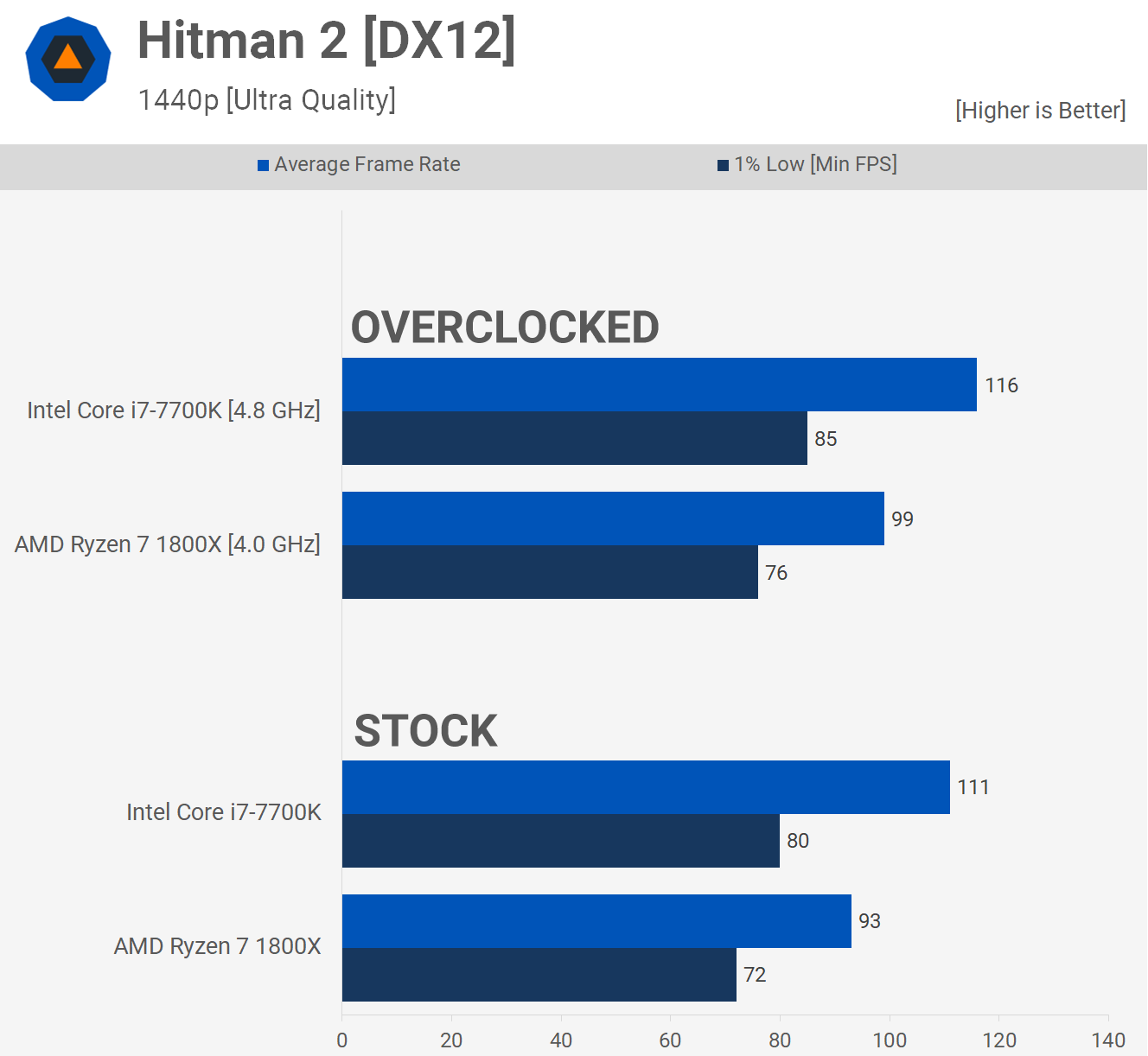
The last game in our list is Total War: Three Kingdoms where both CPUs achieve a similar average frame rate, but the higher core count on the 1800X provides noticeably better 1% low performance.
This is also seen at 1440p when comparing out of the box performance, but we see that the 4.8 GHz all-core overclock gets the 7700K up to speed.

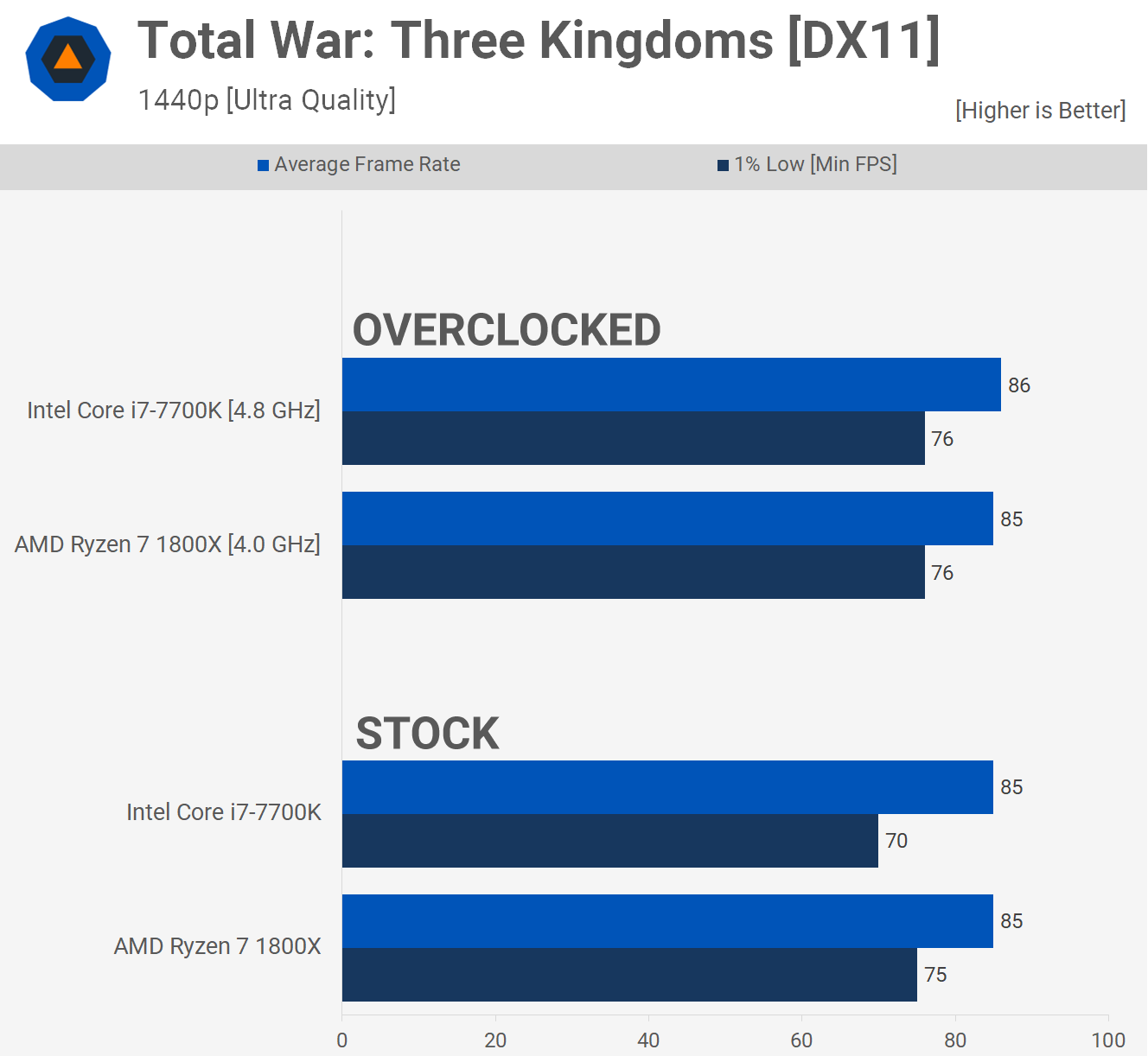
What Did We Miss?
For modern games the Core i7-7700K and Ryzen 7 1800X are evenly matched overall. There are lightly threaded games where the 7700K enjoys a significant frame rate advantage, but in all of those titles the 1800X still provides silky smooth performance. Meanwhile, in the more demanding titles the 7700K is starting to find its limits. When the CPU was completely tapped out the 1% low performance suffered in particular.
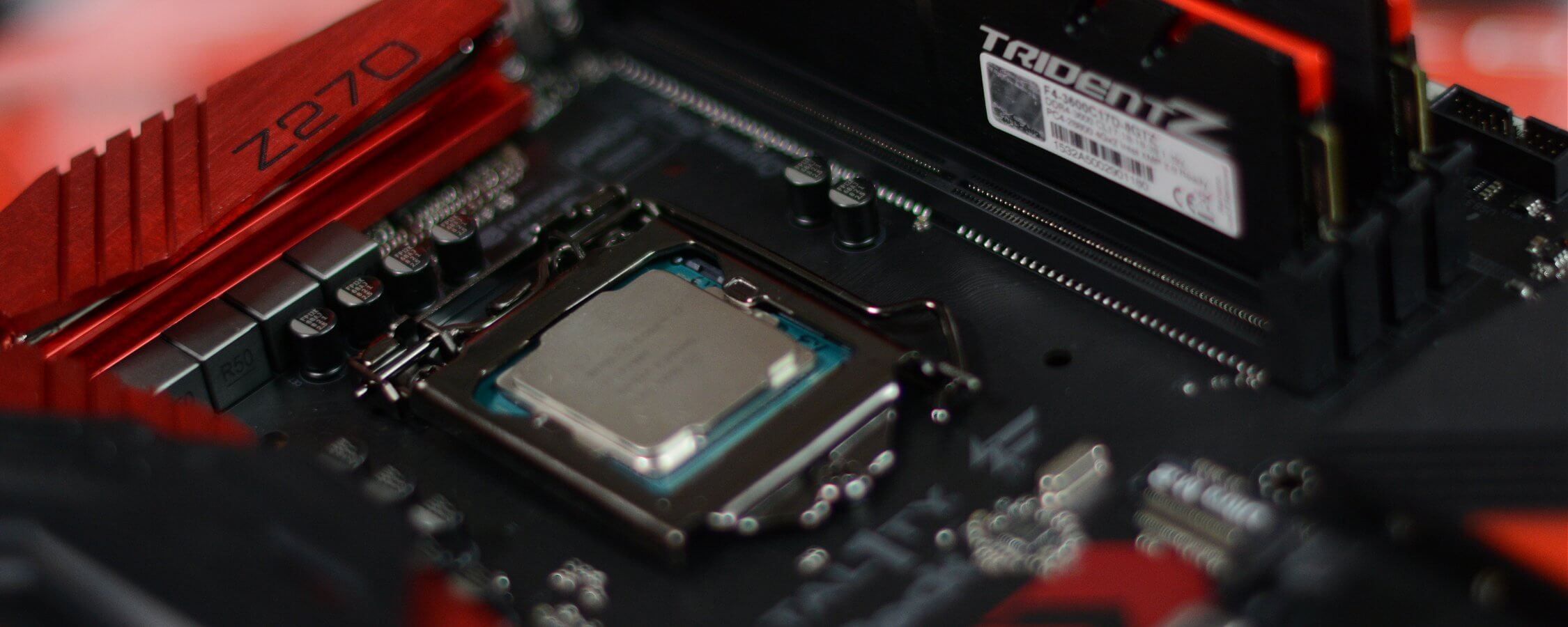
Honestly this situation isn't that dissimilar to what we found in our day-one review two years ago, it's just a tad more pronounced now. Here is a direct quote from our now two-year-old Ryzen 7 review:
One thing we did notice is that all the games we have looked at so far were smooth on the Ryzen processors. GTA 5, for example, plays really well on the Core i7-7700K, but every now and then a small stutter can be noticed, while the 1800X runs as smooth as silk, sans stuttering from what we observed.
We found a similar situation when testing Battlefield 1. Performance was smooth with the Ryzen processors while every now and then the quad-core 7700K had a small hiccup. These were rare but it was something we didn't notice when using the 1800X and 1700X. But as smooth as the experience was, it doesn't change the fact that gamers running a high refresh rate monitor may be better served by a higher clocked Core i7-6700K or 7700K.
While the gaming results might not be as strong as we had hoped for, they are highly competitive and that should hold particularly true for the Ryzen 5 and 3 series. It's also worth noting that we are testing extreme gaming performance here with the Titan XP at 1080p. Ryzen looks more competitive at 1440p, and certainly so when paired with a GTX 1070 or Fury X.
For the most part we'd say that conclusion remains accurate today, though we wouldn't recommend the 7700K over any Ryzen 7 part in 2019, even if they were sold at the same price.
Also the 7700K left us with a bad taste in our mouth after launching at $340 in early 2017 for the LGA1151 socket, it was effectively dead within that same year. In order to remain competitive Intel tacked on two extra cores and released the 8700K in late 2017 for $360 using the same and yet completely incompatible LGA1151 socket.
We've brought up the platform compatibility card many times before, but for good reason. This broken upgrade path left those who invested in the 7700K prior to October 2017 with nowhere to go, while Ryzen owners can still upgrade to this very day.
But without trying to take anything away from Intel, the Core i7-7700K is still a very capable gaming processor, but as a quad-core in 2019 it's starting to falter. On the other hand we expect the first-gen Ryzen processors to gradually improve over the coming years as games continue to better utilize more cores.
Shopping Shortcuts:
- AMD Ryzen 5 2600X on Amazon, Newegg
- Intel Core i5-9400F on Amazon, Newegg
- AMD Ryzen 7 2700X on Amazon, Newegg
- Intel Core i7-8700K on Amazon, Newegg
- GeForce GTX 1660 Ti on Amazon, Newegg
- GeForce RTX 2060 on Amazon, Newegg
- Radeon VII on Amazon, Newegg
- GeForce RTX 2080 on Amazon, Newegg
- GeForce RTX 2080 Ti on Amazon, Newegg
